#although i love those aspects of st as well
Text
i hate romance and romantic movies and romantic books. i have never shown any interest in it, and probably never will. it just feels repetitive to me that two people meet each other, they fall in love, kiss and yay! happy ending! (or sad ending if you wish) so i never really liked the genre and avoided it like the plague.
(i say all of this as an aroace as well)
but i make the exception of byler because of the HUGE build up and HUGE drama and the risk of their friendship which they both cherish more than anything. their storyline is just so well-crafted that they are all i will look for in anything romance related now on, if i even wish to. all i will feel is that it does not compare, AT ALL.
safe to say, byler has ruined the romance genre for me, in the best way possible.
it's about how will loves mike so much that he will hide it, only to protect mike and be able to remain his friend, even though it hurts him, how he will choose mike's happiness over his own, and how mike will go to the end of the earth to get will back, how he is afraid to lose the best thing thing he's ever done, how their love for each other has blossomed so slowly over the course of their deep friendship that its not even clear WHEN they actually fell in love, how the entire BASE of their romantic love is their friendship, how the bond they share goes so deep that will was able to recognize mike when he was possessed, how mike was able to pull him out of his possession, how their story is NOT just a typical romance, how it has been stretched on for so long, but has not grown old, how the characters hurt each other, but will still choose to love each other. i could go on and on, but
how these two made me, a person who despises romance more than the sound of velcro (and trust me, i HATE the sound of velcro), get completely engrossed in their story and have just the tiniest bit of hope that maybe love is not dead after all.
#byler#i did not think i would write this much on this topic#this was supposed to be a short post on how byler changed my view on romance#but here we are#anyway#i am not opposed to other ship pairings#but the spark in byler just feels different#and no its not because its an mlm pairing#i just love the storyline#and also would if it was gay or straight or lesbian or just anything really#its just the first time i have gravitated to a ship specifically#instead of the theme of the story or the way its written#although i love those aspects of st as well#apologies for the word vomit in the post and also the tags#i'll head out now
12 notes
·
View notes
Text
LACKADAISY Pilot Short Review & Thoughts: INDIE Animation Greatness.

Okay, so I've just recently gotten finished watching the latest new indie animated pilot short: Lackadaisy. Honestly, I truly and seriously loved this 27-minute long film of bootlegging kitties' adventure! Now for those who are super new to this short and overall story of the Lackadaisy world, the short takes place in 1920s America specifically in St Louis Missouri during the prohibition era when all things alcoholic were OutLaw and where most of the characters consist of anthropomorphic cat people in this story.
The title comes from the name of the café also covered as an underground speakeasy "The little Daisy Café " or for very special Partons and guests that want to get their illegal drink on known as the Lackadaisy speakeasy. All in all, the business hasn't been like it used to be for the little once glamorous speakeasy, leaving our main cat trio of trouble of the short to dig up some much-needed booze. We got the highly chaotic also artistic wild spirit, wacky, smart but slightly dimwitted sweet grinning nut Rocky Rickaby. His baby-faced sweet and super adorable well mannered but deeply repressed rage Trigger happy cousin Calvin "Freckle" McMurray ,and last but not least little miss firecracker and sweetie full of spunk Ivy Peppers.
On the revival competitor side that is Marigold. We got our Cajuns sensations siblings danger duo the Savoy: Serafine and Nicodeme, And last Mr. Tuxedo always serious catman and professional "cleaner" extraordinaire Mordecai Heller who has some past history with the Lackadaisy staff & it past owner. Now a little details on what and why I enjoyed this film.
The Animation: Lackadaisy overall animation is fantastical amazing, like UGH from the impressive shading and lighting within the backgrounds from the way the characters eyes are super luminescence in the dark and really gives that feline aspect. To the intricate little details such as the characters very realistic cat ear twitching and other behavioral cat traits like the tail movements and fizzing of the fur when scared or startle, some criticism I've seen in the Live Chat in regards to the left in sketch/guidelines within the characters is that it's distracting. But personal for me I liked the added in sketch linework, it deeply reminded me of super old school classic Disney animation or seeing old traditional animationing videos on how they did things back in the day.
The Voice acting: I swear the voice casting in this was excellent and very on point. Each of the voice actors really fit so well into each of their characters, from Michael Kovach great voice work as Rocky who you can tell was really enjoying himself, to Channel Awesome Malcolm Ray as Nico and Benni Latham as Serafine and ProZD also known as SungWon Cho very nice and fantastic voice work as Mordecai and Belsheber Rusape as Freckle and Ashe Wagner as Mitzi, Lisa Reimold as Ivy. Just overall real good sounding Voice work.
The Story: Now when it comes to overall story, I liked how it was basically more of a standalone type of storytelling in its own kind of separate reality then what's currently going on in the comic thus far into it. I can maybe see others who've been following the webcomic for far longer might dislike certain changes in the pilot that differ a bit from the comic, but I can get why they went with it this way so it probably would be easier for newcomers to jump into it. While certain parts did felt a bit underwhelming & might not be super perfect, I still enjoyed the energy and pacing of this short. I felt they did a really good job as a pilot showcasing the premise /concept and some of the characteristics of the main cast, although not all of them...but I felt it did a nice enough job of giving you a taste of these characters and making you want more of them & find out what's their story is. Either way love how the pilot plot was this mini but disastrous bootlegging adventure of Rocky, Ivy and Freckle getting into trouble barely escaping with their lives all for some nasty tasting booze.
Final Thoughts: While I might not have been following this project or webcomic since early DeviantArt or back during the mid-2000s to 2010s ( even though I wished I got into it much earlier) as long as others have. But even as a somewhat new fan of this indie piece of work and incredible artsy, I truly really come to love Lackadaisy so much and I deeply hope that this pilot short will paved the way for even more crime-fulled animated kitties adventures in the future.
Please Check Out LACKADAISY and give it all the love and support it can get because I want more Booze stealing lawbreaking Cats to see!
#indie animation#adult animation#animation#lackadaisy#animated pilot#animated film#animated shorts#2023 animation#2d animation#animated short film#animated films#lackadaisy cats#youtube animation
64 notes
·
View notes
Note
Happy STS!
What is your favourite genre to read? Is it the same as your favourite genre to write?
What subgenres within that genre are your favourite to read? Are they the same ones you like to write?
Happy STS Kate! My favorite genre to read overall is crime - especially thrillers, but mysteries and horror with crime plots as well, to a lesser extent. I must say I've been *very* partial to litfic (especially slice-of-life) lately as well, though - especially with crime elements, but not exclusively. This more or less lines up with what I write, as I predominantly write under the crime fiction umbrella. My shorter works tend to be more lit-adjacent, while my longer works tend to be genre fiction (thrillers or horror, typically, although I tend to genre-blend a fair amount).
In terms of subgenres: in terms of both reading and writing, I'm much more drawn to the contemporary realm (ie. realistic fiction), and typically stay away from horror/thrillers with SFF or supernatural plots - with some exceptions - as the horror of the mundane, horror based on realistic scenarios (eg. lots of gothic plots), and the more psychological aspects of horror tend to be what appeal to me. In terms of thrillers specifically, I love crime thrillers, psychological thrillers, and domestic thrillers, and tend to more or less stay away from the other genres - I'm a sucker for tragic elements, unreliable narrators, and complex, messed up, and/or unsympathetic characters and relationship dynamics, all of which are front-and-center in those subgenres. In general, I'm much less drawn to thrillers and crime novels where the MCs are cops/investigators; I prefer for the narrative to be directly involved in the central crime in some way, ie. stories told from the victim's perspective, perpetrator's perspective, family members, close friends, things like that. Or, conversely, it can also be fun when the narrator is a random-ass person who gets inadvertently sucked into the story events in some unlikely way.
6 notes
·
View notes
Text
hi guys tumblr just let me back into this account (read: i got a new laptop and completely forgot the password for this account until now)
i'm back to talk about religion (i saw someone on here talking about ocean's entire thing w/ having a bat mitzvah and confirmation and it got me thinking, i think it was @/pheliau ??)
(TW for mentions of religion, primarily catholicism for those who need it!! stay safe friends)
(im not jewish so i cannot offer any insight into that aspect of ocean's character, but i am vaguely* catholic so i will be speaking from that perspective!)
confirmation is a sorta a big deal to Catholics (???), mainly bcuz we're baptized as babies and confirmation is quiet literally confirming that baby baptism (confirmation is basically just baptism #2). that being said, did ocean ever have a baptism in the first place? her parents don't seem ultra-religious (and you don't have to be catholic to go to a catholic school), so i doubt she was baptized as a baby, which is arguably a bigger deal than confirmation (note on this: i say that confirmation isn't as big a deal because typically the baptism is the most important part, the confirmation is the other thing you have to do *eventually*, there isn't a specific age when a person is supposed to be confirmed---personally, i put it off for as long as i could because i didn't feel like going through the entire thing)
i wonder how ocean convinced St. Cassians (which is, I'm assuming, the catholic church in Uranium) to confirm her if she didn't have a baptism?? maybe she speed-ran her baptism too?? (lmao imagine you had her baptism, confirmation, and bat mitzvah in the same weekend) although, i will say, typically the process of getting confirmed is not a long one---some Catholics do sunday school for a couple of years in preparation for confirmation, but some learn a couple of prayers, do a confession, and then get confirmed. the process of the different rites varies a lot depending on the community your in
tl;dr: confirmation is not rlly /that/ big of a deal, but ocean probably had to have been baptized first, so either her parents had her baptized when she was younger OR she speedran her baptism as well as her confirmation as well as her bat mitzvah (also, i am aware that this is a joke in the show, but i think it's very interesting to think about)
*by vaguely catholic, i mean that i don't really practice catholicism? i guess it could be classified as being culturally catholic, but it is a little bit more than that. in essence, my community as a whole is very lax about religion and it's typically not discussed very often. basically, i don't formally practice catholicism but i do know a whole lot about it, but what i know about it might be specific to my community. take what i say w a grain of salt! i just love ocean a lot and want to talk about her
(i find different religions very interesting as a part of culture so i don't shy away from discussing it, but i probably won't make a habit of it! just wanted to get my thoughts out of the way)
#rtc#ride the cyclone#rtc musical#ride the cyclone musical#some analysis#more speculation#tw for mentions of religion! (specifically catholicism)#ocean rtc#ocean o'connell rosenberg
14 notes
·
View notes
Note
Happy STS, Aria!
On a scale from aphantasia to complete movie, how well can you picture things you're writing? Is there any difference to when you're just the reader?
Hi and thank you for the ask!
I can picture things somewhat and the context of what I am doing matters a lot, although the difference is not that much between reading and writing, I feel, as it is between reading/writing or daydreaming.
I already think very much in words, but when I am daydreaming, I do get very... vibes based images? I can translate them to actual images when drawing, but details are just not there. These images rely heavily on atmosphere, pose and the kind of emotions it evokes. Like, say, I might get a person lounging on a throne, know that I am seeing it from a lowered perspective and the vibe that is conveyed for this scene, but please don't ask me what this person looks like (unless some aspect of that appearance is plot relevant) or what colour the throne is.
My daydreams are a mix of those images and a running narration/dialogue. Which is the reason I have no idea what any of my characters look like, unless I sit down and design them on a piece of paper (or in an art program). Except, again, for things that I can tie to their personality or that is somehow relevant for the story/worldbuilding.
When reading and writing, I process things almost entirely as words ... I think. It is hard for me to tell, because as soon as I pay attention to how I process things when reading, I stop doing it. I think that I do still get some general visual ideas, mostly because sometimes I stumble across something that I can't imagine (or with illustrations, sometimes I am thrown because, say, my imagination mixed up left and right and everything is on the wrong side).
And when writing I need to ... essentially translate my daydreams into words? So it is also heavily text based, but the images were already there, so in a way I am kind of describing them I guess?
But, again, no details and I have absolutely no idea how any characters described in anything look like. Especially faces. I cannot imagine faces. At all. If you asked me to describe my mother's face, I couldn't do it.
Also, the fact that I cannot imagine details is the reason why I hate long, loving descriptions of scenery or characters, because it gives me absolutely nothing and I just end up getting bored x'D (*cough* hence why I never managed to read Lord of the Rings)
#ari answers asks#sts#sts ask#storyteller saturday#i never now what anybody looks like#and for the most part#i don't care what they look like#some features are important#i get that#but why should i care whether this person has blue or green eyes#they're eyes#you can use them for seeing things#unless you can give me a pretty picture#then i care#because i like pretty pictures#and diverse casts look vastly more interesting in pretty pictures#even discounting other reasons why i thing they're good#wow#apparently i had a lot of thoughts on this
6 notes
·
View notes
Text
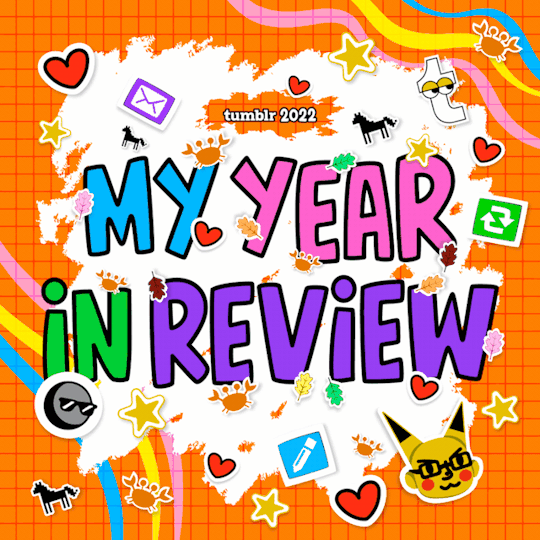
I posted 17,825 times in 2022
That's 6,060 more posts than 2021!
141 posts created (1%)
17,684 posts reblogged (99%)
Blogs I reblogged the most:
@wedonttradelives
@nightlocktime
@beradan
@madfatandhungry
I tagged 1,212 of my posts in 2022
#derry girls - 65 posts
#derry girls spoilers - 64 posts
#stranger things - 38 posts
#bridgerton spoilers - 36 posts
#bridgerton - 36 posts
#stranger things spoilers - 35 posts
#ms. marvel - 27 posts
#wednesday100 - 23 posts
#ms. marvel spoilers - 22 posts
#outlander - 21 posts
Longest Tag: 138 characters
#''oh they're going to make a good train/public transit for the poors? better pretend i'm making a super train so they cancel theirs'' 🙄😑
My Top Posts in 2022:
#5
Wednesday 100: Family History
Sometimes on rainy days, Bree explores the study while her father examines the ledgers.
Today she finds a box, opening it quickly before Da sees. The spoons are familiar. She keeps hers, St. John, hidden away from her cousins. Willie, born near harvest, has St. Peter.
Counting, she frowns, asks before she can think better, "Da, where's St. Andrew's spoon?"
Da sets down his quill gently. He leans back in his seat and closes his eyes. When he opens them, he starts softly, "When yer mam and I were in Paris…"
She thinks she sees him crying, just a little.
83 notes - Posted August 31, 2022
#4
Wednesday 100: Telling Tales
They're happy to have all the grandchildren staying over at the Big House, although it means Jamie covering Claire's noises, the two of them hushing their laughter.
Once recovered, they get up to listen for the children, hearing Germaine's voice down the hall.
"—and they brought in a lady, wearing only her shift, looking very scared but also brave, and it was—"
"Grannie," Jem says excitedly. Joan sighs, "I love this part."
Claire leans into Jamie. "Seems that someone's inherited a certain talent of yours."
"Well, they've heard this one often enough." He smiles, and takes her back to bed.
88 notes - Posted November 9, 2022
#3
I think one of the reasons that the fakeout in The Long Goodbye Job works so well is also one of the reasons I love Leverage as a show. Yes, we’re so deeply invested in these characters that the idea of them coming to harm is heartbreaking, but it feels believable because we’ve been conditioned, by media, but also by our own lived reality, that no one can always win. Maybe you make a mistake, forget or overlook something, maybe you’re outsmarted, maybe your luck simply runs out, but at some point you will come to the end of the line. (”Give all of us...the strength to remember that life is so very fragile. We are all vulnerable. And we will all, at some point in our lives... fall. We will all fall,” says Coach Taylor.)
And amid the competence porn, the show doesn’t shy away from that very human aspect of it all, gives us Hardison buried alive, Parker’s childhood and its lasting effects on her, Eliot’s violent past, Sophie’s uncertainty about herself. The show gives us Nate, troubled and gray and full of hubris and flawed all to hell - couldn’t save his father, couldn’t save his son. But it also gives us this, ends with this: the hammer never drops. The villains do not win in the end, do not come close to winning. This unlikely, outcast group, this family, wins, they keep winning, and sometimes, in shows like this, we’re allowed to have faith in that.
225 notes - Posted January 9, 2022
#2
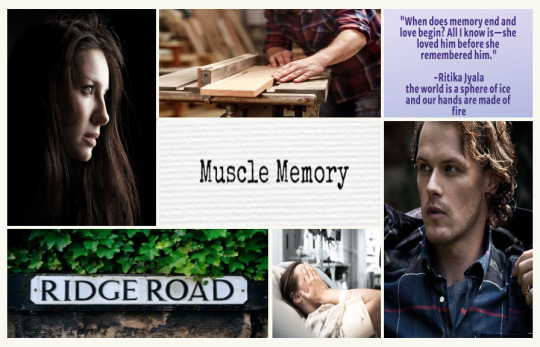
Back again with another Outlander fic! For those of y'all who are interested, I'll be posting on alternating Sundays over the next few months and will reblog this again when the fic is complete. For everyone else, enjoy your regularly scheduled programming!
Muscle Memory, chapter 1
292 notes - Posted July 10, 2022
My #1 post of 2022


See the full post
432 notes - Posted August 1, 2022
Get your Tumblr 2022 Year in Review →
#tumblr2022#year in review#my 2022 tumblr year in review#your tumblr year in review#feeling called out by this somehow 😂#anyway happy end of 2022 to you all and I'll clearly see you always 100% forever
3 notes
·
View notes
Text
Entry 1 - About Me
Words: 498
My name is Archie Roberts, I am twenty years old and live on the Mornington Peninsula. I am currently in my third year of studying sports business at Holmesglen. I completed my high school at Mornington Secondary College and received my VCE certificate. The three sports I follow closely are Australian rules football, basketball and cricket. I used to play football and cricket, but now just play basketball Monday nights in a domestic team. I would absolutely love to work in any of those sports, particularly footy. I also take my health and fitness quite seriously. I run 3-4 times a week and workout every day, track me protein intake, steps and calories eaten. So also working within that space would be appealing to me. In terms of work experience, in high school I did my year ten experience in construction and building but didn’t enjoy it. I work part-time at a pizza store in my local area three nights a week, but that is purely for money purposes. It helps with communication, organisation, teamwork and many other skills. Late last year and early in 2024, I assisted Brad Sykes Sports Consulting a few times. A full seven-hour day running a school holiday clinic with kids aged six to twelve in Bonbeach, and a couple separate running sessions with junior footballers. Both were great experience for me and showed me that work like that is something I would want to do. I do think I enjoy working with children in sport. Although can be frustrating at times, I like seeing them grow and evolve into young men and women. I wish to complete my 228-hour internship with the same organisation. Creating a portfolio is a greatly beneficial element of self-reflection (Chong, 2017).
In terms of career ambitions I have always been interested in sport. In high school my two preferred subjects were physical education and business management. So it was logical decision to combine them for university. I very enjoy every aspect of sports, that being analytics, data, journalism, media and everything in between. The subjects I have studied here during my course I believe have placed me very well for the future, because of how relevant they are. I expect to learn a fair bit from this subject, how to be professional in the workplace, and gain valuable skills for my future careers. I have many areas to improve on moving forward, such as communicating, being initiative and asking questions. I think at the conclusion of this intensive subject, I will have developed amazing skills to greatly assist me with my career moving forward out of uni. Up to this point, I am impressed and pleased with my studies. My results have been good, and I’ve been learning so much. Expectations for this subject are simply to learn how to be professional and become more comfortable in workplace settings. For my internship, I expect to learn a bundle of things, and gain amazing experience in my respective workplace.
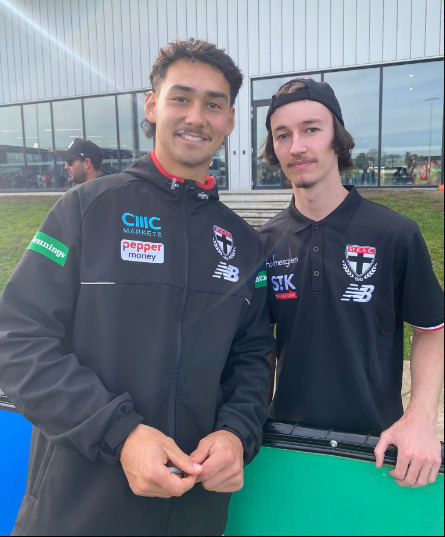
Myself and St Kilda Young Gun Mitchito Owens (From X, April 2023).
References:
Chong, I. (2017). Assessment Dialogues Between Teachers and Students Using e-Writing Portfolios. TESOL Journal, 8(1), 240–243. https://doi.org/10.1002/tesj.312
KingArchboss Twitter/X. (April 2023). Tweets. February 2024.
Saavedra, J. Campos A. Espinoza, M. (2019). Chilean Pre-Service Teachers’ Perceptions Towards Benefits and Challenges of EFL Writing Portfolios. PROFILE Issues in Teachers' Professional Development, 21(2), 79–96. https://doi.org/10.15446/profile.v21n2.73116
0 notes
Note
Hey Angel <3 the hate you're getting is atrocious. I'm new to this fandom but I've seen this almost everywhere. People who seek out things that make them uncomfortable and make it the creator's fault. It is very pathetic <33 I hope you're doing well?
Your ao3 works gives me life. The Darkest Eyes is so special to me because it's so rooted in reality? And reality is gritty and leaves a sour taste most times. It's really the best approach to looking at two very interesting characters.
I wanted to ask - if you've ever wished for ST to embrace a darker vibe than they do or if you are satisfied with how it is at present? (by vibe i mean anything tbh, more permanent deaths, gorier imagery, psychological horror etc)
hello !! thanks for the ask !! it's okei, i'm fine ^-^ ~ i've also been in a lot of fandoms before and some were even more vicious than this one (although, the stranger things / byler fandom is up there in terms of toxicity and negativity, somehow,,,) so this is certainly uncomfortable, but still bearable :]
anyway, glad you like my stories !! you're so very sweet <3 i definitely need to get back to "the darkest eyes" x.x i just haven't been feeling particularly creative and can only manage short-ish stories atm u.u it'll get done some day, though !! pinky-promise !!!
(preferably before s5 is released, but we'll see >.< )
and for sure, i would've loved a darker tone for the show ! specially in s3 and s4. while the first two seasons have just the perfect amount of eeriness, mystery and violence (imo), the latter two could've done a lot more to add to the atmosphere. like s4 !! they could've amped up the psychological horror with vecna / the whole nina project thing. or in s3, with the flayed, they could've done much more in terms of body horror with those guys !
picture this; instead of the simple, spider-like flesh monster, what if it had the faces of the people it was made of somewhere in its body ? like koh from "avatar: the last airbender" or like the ruin enemies from the game "alice madness returns".
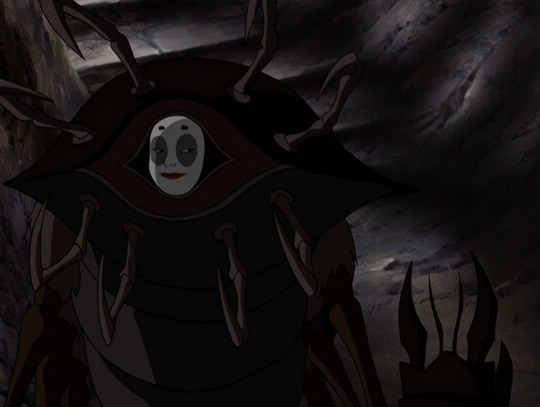
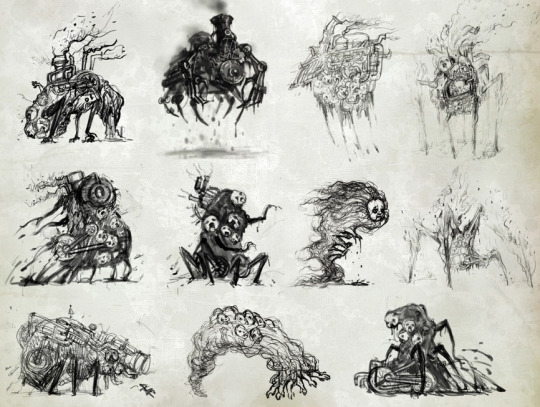
something like that would've added to the horror of it all, considering the kids would've had to look into the eyes of all the people they were going to kill by taking out the flesh creature :O
and of course, the whole permanent deaths thing would've done a lot more to make everything feel much more meaningful and mature,,,
but, as it is, the show's not too bad in terms of horror imagery and concepts. i just wish people didn't forget about that very-important-aspect of the show, and that the showrunners follow through with their promises of raising the stakes, now that most of the audience and cast are all adults >.<
anyway, thanks again for the ask and for the kind words ~! it really means a lot ;-; <3 i hope you have a wonderful day / night !! take care !!!
1 note
·
View note
Text
10 years from now...
Introducing myself in a community is probably one of the toughest things to do for me when asked impulsively. However, those who thoroughly enjoy their accomplishments and private lives with others could see it as yet another chance to showcase their distinctive characteristics. However, it's precisely the reverse in my case. Self-talk has never been my strong suit. I would nevertheless make an effort to best sum up who I am. I want to start by talking about my past before moving on to how I am as a student, how I feel on the inside, and how the rest of the world views me. So let me start by telling you a little bit about me. My name is Justin Ann M. Jose, I am currently a grade 11 STEM student studying in St. Paul university of the Philippines. Now, some people may ask “Why did you chose stem?” To be honest, I really don’t know. A matter in fact, I am still finding my true purpose in life. But one thing I know for sure is that I chose the finest, outstanding, leading school that will surely give me the best possible education that I deserve. When you ask very young children what they want to be when they grow up; they usually say police man, scientist, doctor, engineer, or astronaut. These are the most common responses because they reflect what young children think success looks like. However, young children really aren't taught about the challenges and difficulties involved in achieving success. Another point is that four out of the top five vocations that kids tend to select are STEM-related. Right now, STEM is getting a lot of attention, and you might be asking why. Even if there is an increase in jobs in engineering and technology, is it truly necessary for all students to acquire STEM subjects? It turns out that education in the fields of science, technology, engineering, and math (STEM) is perfectly suited to help children succeed. STEM is more than simply coding and lab coats, as we often say. We may take it for granted, but it is the foundation of manufacturing, food production, healthcare, and so much more. Without it, we would not be able to survive. Right now, we are slowly approaching the end of the first quarter in 1st semester and I think I really made a good choice in choosing stem as my academic strand because it has benefited me in a lot of aspects. We’ve heard the saying “thinking outside of the box”, right? Well, creativity is truly the centerpiece of a STEM education. STEM students are encouraged to come up with unique ideas and to take on an interdisciplinary approach to solving complex issues. STEM is all about empowering kids to ask “why” and “how” questions. STEM will provide students the opportunity to explore their imaginations to come up with imaginative solutions. One thing that also made me love STEM is our university. STEM students can really expand and explore things with the help of the teachers. The facilities in school are also a bonus because we STEM students can really enjoy going to the Laboratory and do experimenting. So far, I think STEM was the best choice after all. Pondering this, I found my answer for what I want to be when I grow up. Maybe the appropriate question for this answer is, “How do you want to exist?” When I “grow up” I want to exist happily. Although it sounds simple, I can imagine it probably won’t be as easy to carry out. There will be highs and, there will be lows. Maybe I will become an anesthesiologist, or maybe I won’t. Whatever I choose career wise, I know it will be because I am happy doing it.
1 note
·
View note
Photo
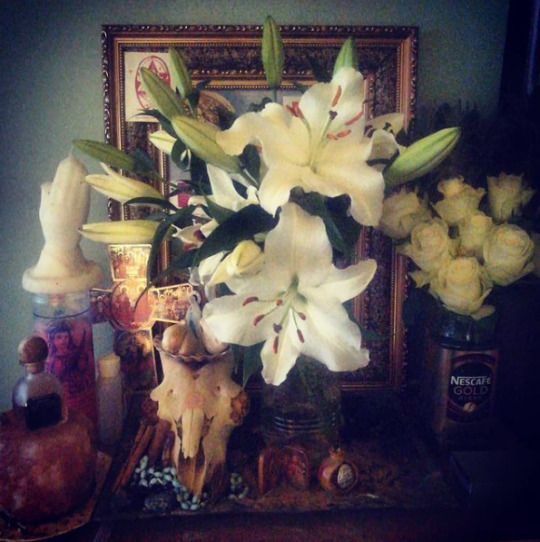
This is a bit of a throw-back as I still need to take pictures of my recently updated altar, but this was my Lourdes healing altar configuration for a long while as part of my prayers for world health.
Lady of Lourdes Healing Altar: Suggested Offerings
These are just what I suggest to include-- not all of these, but any of these you may feel resonate with you-- on any kind of healing/health/sickness/wellbeing altar.
White Flowers
I suggest lilies, although of course if you have pets, please do not risk using white lilies as anecdotally I have noticed these shed more pollen than most other lilies for whatever reason, and that presents a TOXIN THREAT to small animals and household pets.
White roses are perfect and work just as well. I try to include both when I can as a personal thing, as roses bring love and compassionate care and healing, while white lilies are also an offering of peace for any souls who may be on palliative care or those with poor prognosis.
Prayer Hands Candle
If you can obtain one of these, I highly recommend dressing it in any healing oil of your choice and allowing it to absorb as much as possible into the wax, fully drying before lighting it,
It is also good to never burn and simply leave on the altar for if/when you may feel called to use it. It will accumulate the prayers issued at the altar prior to being burned.
Lady of Lourdes Prayer Beads or Blue Rosary
Blue is the colour of calm and healing, as well as the associated colour of water, which can also represent any medicines or aspects of treatment (such as IV fluids).
Holy Water Bottle
It’s hard to see here, but I have a holy water bottle from Westminster Cathedral on my altar here placed sideways as I was in the middle of cleaning my Lourdes holy water bottle when this photo was taken.
To help preserve the holy water bottle while it stands on the altar, place at least three drops of isopropyl alcohol in the bottle to prevent the growth of any bacterium.
Wooden Cross
Ideally made of oak (strength), cedar (whose oil has been used as a medicine and astringent in Europe for centuries), or olive (holy wood).
The ornate cross here was one I obtained when I made my traditional pilgrimage from Southwark Cathedral to Canterbury Cathedral; This cross was bought at Canterbury, but if you live in London, you may find similar crosses at Westminster Abbey as well, if it is easier for you to obtain spiritual supplies there in central London.
It is best to use a cross made of wood that you have a personal connection to, as this is to emphasise our connection spiritually to one another and to all higher powers, to unite us in life and death, illness and health, to draw upon collective wellbeing to balance collective sickness.
Coffee
I used my large coffee glass container to hold the roses; Coffee is a stimulant and is used to pray for endurance, energy, and stamina (quick healing) for those who are acutely or chronically ill.
Skull or Other Bones
You can use anything from cleaned chicken bones to a full skull (mine was gifted to me by a farmer friend after this goat died of natural causes).
The bones represent the physical body and the impermanent nature of life; A traditional altar memento mori, to encourage prayer and meditation on the nature of life.
I put roses in the eye sockets; Red rose for love, yellow rose for friendship and companionship, solidarity and empathy for those who are struggling with poor health.
Small Bottle of Alcohol
I mixed rum and whiskey, as both are traditionally used around the world as the base for tinctures or medicines currently and throughout history.
Salt Candle
If you have a salt candle, you may add it to a healing altar to represent the clearing of miasma or lingering illness.
Any plain white, blue, or pink candle works for this purpose as well.
Cinnamon and Various Spices
Similar to the coffee, this is to represent vitality.
Saint Candle
I used St. Lucy here, as my partner’s brother was just diagnosed with macular degeneration (gradual blindness) when I assembled this altar, so this candle is intended for him as well as for a co-worker who lost an eye owing to complications from diabetes around this time as well.
I recommend St. Jude, St. Raphael, St. Dymphna, or St. Rita for broad application in regards to health or health concerns.
Icons
Made of wood as with the cross notes above is preferable, but not required; You may use any icons or prayer cards etc. that you may have which you feel are appropriate.
Here, I included a pocket diptych of Mary and Jesus, and a St. Michael pomegranate that a very good friend of mine gifted me from Cyprus.
Statues or Statuettes
I have my pocket Lady of Lourdes here, so that she is physically and visibly represented on the altar as a focus of prayer or meditation.
These little plastic pocket statuettes also glow in the dark, so they charge up with photons during the day and with the lights off, they glow beautifully on the altar.
They are inexpensive, making them a great option if you can find these types of mini statues anywhere.
Garlic
Used for waring away illness or evil, also represents purification and protection.
Incense
If you have asthma or cannot tolerate incense, use a bell and ring it three times at least twice a day, once in the morning and again in the evening, at the altar or before and after praying/meditating.
For incense options, I recommend lavender (calming), rose (love and compassion), or rosemary (used traditionally as an astringent and antibacterial medicine).
I hope this is helpful for someone out there, and if you would like, please feel free to share your own healing altar suggestions, ideas, or practices! :) The more we share, the more we learn.
#folk religion#folk magic#folk catholicism#altar#healing#spell#spellcasting#prayer#praying#lady of lourdes#altar space#folk spirituality#spiritual#spirituality#health
58 notes
·
View notes
Text
FIC REC FRIDAY
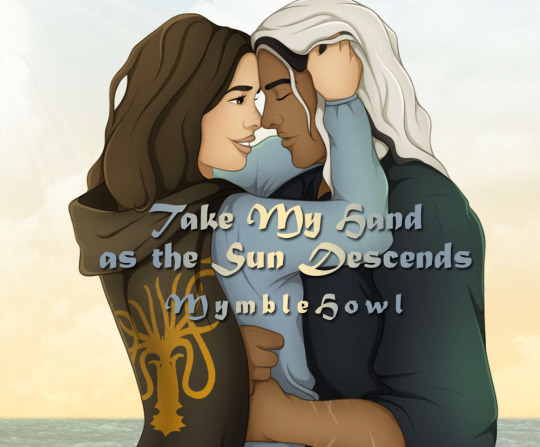
(Banner art by @evax3 - See the full piece here!)
Take My Hand as the Sun Descends by MymbleHowl (@st-clements-steps)
Rated: Explicit / NC-17
Words: 9,266
Archive warnings: Creator Chose Not To Use Archive Warnings
Category: F/M
Pairing/Characters: Theon Greyjoy/Jeyne Poole
Summary: Take me now, baby, here as I am
Pull me close, try and understand
Desire is hunger is the fire I breathe
Love is a banquet on which we feed
The way I feel when I'm in your hands
Take my hand come undercover
They can't hurt you now,
Can't hurt you now, can't hurt you now
This is an absolutely beautiful future-fic about Theon and Jeyne living on the Iron Islands post-war/canon, learning to heal and live and find sexual pleasure together, and falling in love as well! It imagines a tender and endlessly hopeful and happy future for them, although not an unrealistic one and not one that's unaffected by what they've lived through and suffered.The progression of their relationship from slightly-flirty friends to lovers to...well, I don't want to spoil it ;) is very natural and gorgeously done. They have deep and meaningful conversations about relationships and desire and what those things mean, as well as their pasts and the people who have meant a lot to them. (Theon is as angsty about Robb as you might expect, for one.) It's also so wonderful, a fairly refreshing in post-canon fic, to see Theon in a position where he has to relearn and adapt to a lot of things but he’s still confidant and the one one with more experience on the subject (of sex) and takes the lead.
Outside of just the relationship with Jeyne, this post-canon world around Theon is so beautiful drawn, with a masterful use of language and descriptions. The cameos we get of other characters - Alannys and Asha, and the servants Jeyne befriends - help to make this world feel very fleshed out and lived in, not just a bubble wherein only the central couple exist. There's incredible attention to detail in everything too, including the non-romantic/sexual aspects of Jeyne's and Theon's lives (even if they aren't as much of the focus) so the whole thing feels very balanced and an enrapturing slice or life where our faves (re)discovery themselves and each other.
17 notes
·
View notes
Text
Jon Snow, Manfred & The Byronic Hero: Part 2
Previous Posts: PART 1
Hopefully Part 1 served as a good introduction on the topic and characteristics of the Byronic Hero, as well as how Jon Snow in particular is likely an iteration of this figure. But now we come to the real meat of this meta series — a closer look at Byron's dramatic poem Manfred (1816–1817), and more importantly, its titular character in comparison to Jon Snow. I was originally going to do an analysis and comparison of two key episodes in Manfred and A Storm of Swords, Jon VI, but have since decided to give that its own post... that's right kids, there will be a part 3!
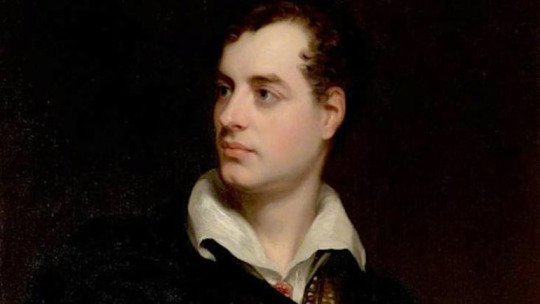
(Detail from Lord Byron, Thomas Phillips, 1813)
So... why Manfred? Why not Childe Harold's Pilgrimage, or The Corsair, or Don Juan, or any other work by Lord Byron? Well, I'll tell you why, my sweet summer children. It's because of THIS:
Manfred/Manfryds and Byrons in ASOIAF, by order of first appearance and publication:
Ser Manfred Swann (ASOS, Jaime VIII)
Ser Manfred Dondarrion (The Hedge Knight)
Manfred Lothston (The Sworn Sword)
Manfryd o' the Black Hood (AFFC, Brienne I)
Manfryd Yew (AFFC, Jaime V)
Ser Byron the Beautiful (AFFC, Alayne II, TWOW, Alayne I)
Ser Byron Swann (ADWD, Tyrion III)
Manfryd Merlyn of Kite (ADWD, Victarion I)
Manfryd Mooton, Lord of Maidenpool (The Princess and the Queen, TWOIAF)
Manfred Hightower, Lord of the Hightower (TWOIAF)
Manfred Hightower, Lord of the Hightower (Fire and Blood)
Like... what the hell, George?
I find this very interesting, very interesting indeed! *cough* intentional, very intentional *cough* And I have to thank @agentrouka-blog for reminding me of the existence of these Manfreds/Manfryds, and thus pointing me in this particular direction. This evidence is, for me, my smoking gun, it's why I feel justified in exploring this specific work. In my opinion, it really strongly confirms that GRRM is aware of Manfred, he is aware of its author — as a literary name, it is pretty much exclusively connected to Byron, it's like Hamlet to Shakespeare, or Heathcliff to Emily Brontë. In fact, GRRM likes it enough to use this name several times in fact, its frequency of use aided by a slight variation on its spelling.
So, as we can see, there are a striking number of Manfred/Manfryds (9!!) featured in the ASOIAF universe, whereas Byron (2) is used a bit more sparingly — perhaps because the latter, if more liberally used, would become far more recognisable as an overt literary reference? Interestingly, though, we can see a direct link between the two names as both bear the surname Swann: Ser Manfred Swann and Ser Byron Swann (note the exact spelling of Manfred here, as opposed to Manfryd). Ser Byron was alive during the Dance of Dragons and died trying to kill the dragon Syrax, whereas Ser Manfred was alive during Aegon V's reign and had a young Ser Barristan as his squire. So, in terms of ancestry, Byron came before Manfred, which makes sense since Lord Byron created the character of Manfred; he is his authorial/literary progenitor, if you will.
But why Swann, though? Is there any significance to that surname? Well, I did a little bit of digging and turned up something very interesting, at least in my opinion. In Percy Bysshe Shelley's poem Lines written among the Euganean Hills (1818), in its sixth stanza, the poet addresses the city of Venice... the “tempest-cleaving Swan” in the eighth line is clearly meant to be his friend and contemporary, Lord Byron, that city’s most famous expatriate:
That a tempest-cleaving Swan
Of the songs of Albion,
Driven from his ancestral streams
By the might of evil dreams,
Found a nest in thee;
(st. 6, l. 8-12)
Ah ha! But let's not forget that the Swanns are also a house from the stormlands — stormlander Swanns vs. "tempest-cleaving Swan." It seems a nice little homage, doesn't it? You could also argue that the battling swans of House Swann's sigil are a possible reference to Byron's fondness for boxing (he apparently received "pugilistic tuition" at a club in Bond Street, London). But to make the references to Byron too overt would ruin the subtly, so it isn't necessary, in my opinion, for the Swanns to be completely steeped in Byronisms.
All in all, it would be very neat of GRRM if the reasoning behind Byron and Manfred Swann is because of this reference to Lord Byron by Shelley. How these names and the characters that bear them might further reference Byron and Manfred is a possible discussion for another day! It's all just very interesting, very noteworthy, and highlights how careful GRRM is at choosing the names of his characters, even very minor, seemingly insignificant ones.
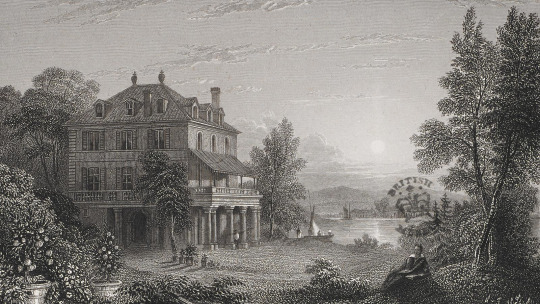
(Illustration of Villa Diodati from Finden's Illustrations of the Life and Works of Lord Byron, Edward Finden, 1833)
Now onto the actual poem, and the ways in which Jon Snow could being referencing/paralleling Manfred. First things first, a bit of biographical context. Take my hand, and let's travel back in time, way back when, to 1816, the year in which Lord Byron left England forever, his reputation in tatters due to the collapse of his marriage and the rumours of an affair with his half-sister, Augusta Leigh (plus he was hugely in debt). No doubt, most of us are familiar with the story, but in 1816 Byron travelled to Switzerland, to a villa on Lake Geneva, where he met the Shelleys and suggested that they all pass the time by writing ghost stories.
The most famous story produced by them was, of course, Mary Shelley's Frankenstein (1818) — which may have served as the partial inspiration behind Qyburn and Robert Strong! Byron himself did begin a story but soon gave it up (yesss, we love an unproductive king); it was completed, however, by his personal physician, John William Polidori, and eventually published, under Byron's name, as The Vampyre (1819). But Byron didn't completely abandon the ghost story project, as later that summer, after a visit by the Gothic novelist M. G. Lewis, he wrote his "supernatural" tragedy, Manfred (1817).*
*I've seen it dated as 1816-17, but the crucial thing to rememeber, in terms of Byron's own biography, is that unlike The Bride of Abydos, he wrote it after his departure from England... this theme of exile will come up later.
Manfred is what is called a "closet drama", so is structured much like a play, with acts and scenes, though it wouldn't have actually been intended to be performed on stage. Indeed, Lord Byron first described Manfred to his publisher as "a kind of poem in dialogue... but of a very wild—metaphysical—and inexplicable kind": "Almost all the persons—but two or three—are Spirits... the hero [is] a kind of magician who is tormented by a species of remorse—the cause of which is left half unexplained—he wanders about invoking these spirits—which appear to him—& are of no use—he at last goes to the very abode of the Evil principle in propria persona [i.e. in person]—to evocate a ghost—which appears—& gives him an ambiguous & disagreeable answer..."*
*As in Part 1, more academic references will be listed in a bibliography at the end of this post.
To sum up the narrative for you, Manfred is a nobleman living in the Bernese Alps, "tormented by a species of remorse", which is never fully explained, but is clearly connected to the death of his beloved Astarte. Through his mastery of poetic language and spell-casting, he is able to summon seven "spirits", from whom he seeks the gift of forgetfulness, but this plea cannot be granted — he cannot escape from his past. He is also prevented from escaping his mysterious guilt by taking his own life, but in the end, Manfred does die, thus defying religious temptations of redemption from sin. He therefore stands outside of societal expectations, a Romantic rebel who succeeds in challenging all of the authoritative powers he faces, ultimately choosing death over submission to the powerful spirits.
According to Lara Assaad, the character of Manfred is the "Byronic hero par excellence", as he shares its typical characteristics found in Byron's other work (as discussed in Part 1), "yet pushed to the extreme." As noted above, there is a defiance to Manfred's character, which is arguable also found in Jon. Certainly though, in all of Byron's works, the Byronic Hero appears as "a negative Romantic protagonist" to a certain extent, a being who is "filled with guilt, despair, and cosmic and social alienation," observes James B. Twitchell. I'll come back to those characteristics presently.
As noted by Assaad, "Byron scholars seem to agree on this definition of the Byronic Hero, however they focus mainly, if not exclusively, on the dynamics of guilt and remorse." Indeed, it is only in more recent years that the incest motif, as well as the influence of Byron's own biography, have been more widely discussed. But perhaps the most compelling aspect of the Byronic Hero is his complex psychology. Although trauma theory only really started to flourish during the 1990s, thus providing deeper insight into the symptoms that follow a traumatic experience, it nevertheless seems, at least to Assaad, that "Byron was familiar with it well before it was first discussed by professionals and diagnosed." As we know, GRRM began writing his series, A Song of Ice and Fire, during the 1990s, and character trauma and its effects feature heavily in his work, most notably in the case of Theon Greyjoy, but also in the memory editing of Sansa Stark in terms of the infamous "Unkiss".*
*The editing, or supressing, of memories is not exclusive to Sansa, however. E.g @agentrouka-blog has theorised a possible memory edit with regards to Tyrion and his first wife Tysha.
But if we return back to that original quote, in which GRRM makes the comparison between Jon and the Byronic Hero, his following statement is also very interesting:
The character I’m probably most like in real life is Samwell Tarly. Good old Sam. And the character I’d want to be? Well who wouldn’t want to be Jon Snow — the brooding, Byronic, romantic hero whom all the girls love. Theon [Greyjoy] is the one I’d fear becoming. Theon wants to be Jon Snow, but he can’t do it. He keeps making the wrong decisions. He keeps giving into his own selfish, worst impulses. [source]
As noted by @princess-in-a-tower, there is a close correspondence between Jon and Theon, with each acting as the other's foil in many respects. In fact, Theon does sort of tick off a few of the Byronic qualities I discussed last time, most notably standing apart from society, that "society" being the Starks in Winterfell, due to him essentially being a hostage. Later on, we see him develop a sense of deep misery as well due to his horrific treatment at the hands of Ramsey Snow. Like Theon, his narrative foil, Jon is also a character deeply informed by trauma (being raised a bastard), but the way they ultimately process and express that specific displacement trauma differs profoundly — Theon expresses it outwardly through his sacking of Winterfell, whereas Jon turns his trauma notably inwards.*
*Obviously, I'm not a medical professional — I'm more looking at this from a literary angle, but the articles I've read for this post do include reference to real medical definitions etc.
Previously, I observed how being "deeply jaded" and having "misery in his heart" were key characteristics of the Byronic Hero, as well as Jon Snow — this trauma theory is a continuation of that. Indeed, to bring it back to Manfred, Assaad goes as far as stating that the poem's titular hero "suffers from what is now widely recognised as post-traumatic stress disorder (PTSD)." I am purposely holding off on discussing what the origin of that trauma is, in relation to Manfred specifically, because, well... it needs a bit of forewarning before I get into it fully. Instead, let's look at the emotions it exacerabates or gives rise to, as detailed by Twitchell, and how they might be evident in Jon and his feelings regarding his bastard status.
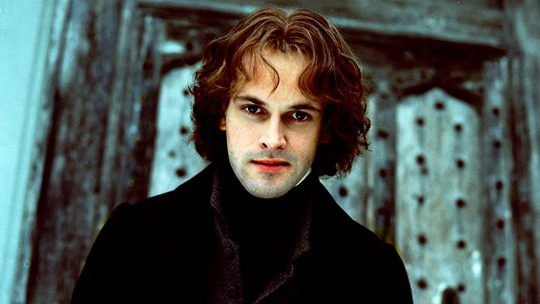
(Jonny Lee Miller as Byron in the two part BBC series Byron, 2003)
Guilt
Does Jon suffer guilt due to him being a bastard and secretly wanting to "steal" his siblings' birthright? I'd say a strong yes:
When Jon had been Bran's age, he had dreamed of doing great deeds, as boys always did. The details of his feats changed with every dreaming, but quite often he imagined saving his father's life. Afterward Lord Eddard would declare that Jon had proved himself a true Stark, and place Ice in his hand. Even then he had known it was only a child's folly; no bastard could ever hope to wield a father's sword. Even the memory shamed him. What kind of man stole his own brother's birthright? I have no right to this, he thought, no more than to Ice. – AGOT, Jon VIII
He wanted it, Jon knew then. He wanted it as much as he had ever wanted anything. I have always wanted it, he thought, guiltily. May the gods forgive me. – ASOS, Jon XII
But I think Jon's sense of guilt also extends to the high expectations he sets for himself, his "moral superiority" in the face of his bastard status, as discussed in Part 1. He feels guilt pulling him in two different directions, in regards to Ygritte: guilt for loving her, for breaking his vows, and potentially risking a bastard, but also guilt for leaving her, for abandoning her, and potentially leaving her unprotected:
His guilt came back afterward, but weaker than before. If this is so wrong, he wondered, why did the gods make it feel so good? – ASOS, Jon III
Ygritte was much in his thoughts as well. He remembered the smell of her hair, the warmth of her body... and the look on her face as she slit the old man's throat. You were wrong to love her, a voice whispered. You were wrong to leave her, a different voice insisted. He wondered if his father had been torn the same way, when he'd left Jon's mother to return to Lady Catelyn. He was pledged to Lady Stark, and I am pledged to the Night's Watch. – ASOS, Jon VI
"I broke my vows with her. I never meant to, but..." It was wrong. Wrong to love her, wrong to leave her..."I wasn't strong enough. The Halfhand commanded me, ride with them, watch, I must not balk, I..." His head felt as if it were packed with wet wool. – ASOS, Jon VI
This guilt surrounding leaving the women/girls he cares about unprotected also extends to Arya. Yet it was his need to prove himself as something more than just a bastard, by joining the Watch, which initially prevents him from acting, and which also makes him feel guilt for being a hyprocrite:
Jon felt as stiff as a man of sixty years. Dark dreams, he thought, and guilt. His thoughts kept returning to Arya. There is no way I can help her. I put all kin aside when I said my words. If one of my men told me his sister was in peril, I would tell him that was no concern of his. Once a man had said the words his blood was black. Black as a bastard's heart. – ADWD, Jon VI
I think there is a lack of reconciliation between Jon and his bastard status, between what being a bastard implies in their society: lustful, deceitful, treacherous, more "worldly" etc. Deep down, subconsciously, Jon really rebels against it. You can see that rebellion more clearly in his memories as a younger child, less inhibited:
Every morning they had trained together, since they were big enough to walk; Snow and Stark, spinning and slashing about the wards of Winterfell, shouting and laughing, sometimes crying when there was no one else to see. They were not little boys when they fought, but knights and mighty heroes. "I'm Prince Aemon the Dragonknight," Jon would call out, and Robb would shout back, "Well, I'm Florian the Fool." Or Robb would say, "I'm the Young Dragon," and Jon would reply, "I'm Ser Ryam Redwyne."
That morning he called it first. "I'm Lord of Winterfell!" he cried, as he had a hundred times before. Only this time, this time, Robb had answered, "You can't be Lord of Winterfell, you're bastard-born. My lady mother says you can't ever be the Lord of Winterfell."
I thought I had forgotten that. Jon could taste blood in his mouth, from the blow he'd taken. – ASOS, Jon XII
But Jon knows this truth about himself, he knows that he has "always wanted it", and that causes him so much guilt because he can't allow himself to be selfish in that regard, because to do so would confirm for him his worst fears... that he truly is a bastard in nature as well as birth — treacherous, covetous, dishonourable.
Despair
As he grows up, learning to curb his emotional outbursts from AGOT, Jon appears more and more stoic upon the surface. But beneath that, buried in his subconscious in the form of dreams, you have this undyling feeling of despair, this trauma connected to his bastard status, his partially unknown heritage:
Not my mother, Jon thought stubbornly. He knew nothing of his mother; Eddard Stark would not talk of her. Yet he dreamed of her at times, so often that he could almost see her face. In his dreams, she was beautiful, and highborn, and her eyes were kind. – AGOT, Jon III
These recurring dreams, sometimes explicitly involving his unknown mother, sometimes not, represent a clear gap, a gaping blank in Jon's personal history and his perception of his identity:
"Sometimes I dream about it," he said. "I'm walking down this long empty hall. My voice echoes all around, but no one answers, so I walk faster, opening doors, shouting names. I don't even know who I'm looking for. Most nights it's my father, but sometimes it's Robb instead, or my little sister Arya, or my uncle." [...]
"Do you ever find anyone in your dream?" Sam asked.
Jon shook his head. "No one. The castle is always empty." He had never told anyone of the dream, and he did not understand why he was telling Sam now, yet somehow it felt good to talk of it. "Even the ravens are gone from the rookery, and the stables are full of bones. That always scares me. I start to run then, throwing open doors, climbing the tower three steps at a time, screaming for someone, for anyone. And then I find myself in front of the door to the crypts. It's black inside, and I can see the steps spiraling down. Somehow I know I have to go down there, but I don't want to. I'm afraid of what might be waiting for me. The old Kings of Winter are down there, sitting on their thrones with stone wolves at their feet and iron swords across their laps, but it's not them I'm afraid of. I scream that I'm not a Stark, that this isn't my place, but it's no good, I have to go anyway, so I start down, feeling the walls as I descend, with no torch to light the way. It gets darker and darker, until I want to scream." He stopped, frowning, embarrassed. "That's when I always wake." His skin cold and clammy, shivering in the darkness of his cell. Ghost would leap up beside him, his warmth as comforting as daybreak. He would go back to sleep with his face pressed into the direwolf's shaggy white fur. – AGOT, Jon IV
"That always scares me", he says quite tellingly. From this key passage, in particular, we can see that Jon feels a deep rooted despair at essentially being unclaimed, unwanted... being without a solid (Stark) identity around which to draw strength and mould himself. He's afraid of being a lone wolf, because as we all know, "the lone wolf dies, but the pack survives," (AGOT, Arya II).
This dream points him in the direction of the crypts — "somehow I know I have to go down there, but I don't want to" — which actually does have the answers he seeks because that is where Lyanna Stark is buried. Yet Jon is "afraid of what might be waiting for [him]", and wants to "scream" with dispair because of the darkness. So, this need for a confirmed identity is a double edged sword, which will no doubt be further complicated when his true parentage is revealed.
Elsewhere, Jon's dreams continue to have this despairing quality to them, often involving Winterfell, the Starks, and especially Ned, which is very interesting on a psychological level:
The grey walls of Winterfell might still haunt his dreams, but Castle Black was his life now, and his brothers were Sam and Grenn and Halder and Pyp and the other cast-outs who wore the black of the Night's Watch. – AGOT, Jon IV
Last night he had dreamt the Winterfell dream again. He was wandering the empty castle, searching for his father, descending into the crypts. Only this time the dream had gone further than before. In the dark he'd heard the scrape of stone on stone. When he turned he saw that the vaults were opening, one after the other. As the dead kings came stumbling from their cold black graves, Jon had woken in pitch-dark, his heart hammering. Even when Ghost leapt up on the bed to nuzzle at his face, he could not shake his deep sense of terror. He dared not go back to sleep. Instead he had climbed the Wall and walked, restless, until he saw the light of the dawn off to the east. It was only a dream. I am a brother of the Night's Watch now, not a frightened boy. – AGOT, Jon VII
But it is never "only a dream", is it?
And when at last he did sleep, he dreamt, and that was even worse. In the dream, the corpse he fought had blue eyes, black hands, and his father's face, but he dared not tell Mormont that. – AGOT, Jon VIII
Even Jon's conscious daydreams in AGOT revolve around his dispairing search for a solid identity:
When Jon had been Bran's age, he had dreamed of doing great deeds, as boys always did. The details of his feats changed with every dreaming, but quite often he imagined saving his father's life. Afterward Lord Eddard would declare that Jon had proved himself a true Stark, and place Ice in his hand. Even then he had known it was only a child's folly; no bastard could ever hope to wield a father's sword. Even the memory shamed him. What kind of man stole his own brother's birthright? I have no right to this, he thought, no more than to Ice. – AGOT, Jon VIII
A lot of these early dreams occur in A Game of Thrones, probably in response to his removal from Winterfell... his self exile. But later on in the series Jon continues to have dreams that tie him to the Starks and to Winterfell, ominous and sometimes despairing too. There's honestly too many instances to list, but if you want to understand the root of Jon's existential despair... it's in his dreams.
Cosmic Alienation
Cosmic alienation, now that's an interesting one in regards to Jon, since he definitely hasn't reached this state... yet. Life and his belief in the divine (the old gods) still hold meaning for him, but then he gets murdered by his black brothers. In the show, the writers hint at some cosmic alienation through Jon stating that he saw "nothing" whilst dead, but then they take it no further and generally do a piss poor job of post-res Jon. This characteristic of Manfred coming to the fore in Jon depends on what happens in The Winds of Winter, but I don't think it is at all that far fetched to assume that Jon will return to his body with a darker, altered perception of things.
Social Alienation
In Part 1, I discussed how Jon, like Byron's heroes, could be read as a "a rebel who stands apart from society and societal expectations." On a more psychological level, we can see how this Otherness, stemming from his bastard status, deeply affects Jon and his perception of himself and the world:
Benjen Stark gave Jon a long look. "Don't you usually eat at table with your brothers?"
"Most times," Jon answered in a flat voice. "But tonight Lady Stark thought it might give insult to the royal family to seat a bastard among them." – AGOT, Jon I
In his very first chapter, we see him quite literally alienated from the rest of his siblings, made to sit apart from them, an apparent necessity he seems fairly resigned to. Also in Part 1, I gave examples of instances in which Jon is mockingly called "Lord Snow," as well as a "rebel", "turncloak", "half-wildling", all of which serve to alienate him from the rest of the brothers of the Night's Watch.
Stannis gave a curt nod. "Your father was a man of honor. He was no friend to me, but I saw his worth. Your brother was a rebel and a traitor who meant to steal half my kingdom, but no man can question his courage. What of you?" – ASOS, Jon XI
The above interaction may seem on the surface to be about one thing — whether or not Jon will be of help to Stannis, offer him loyalty etc. — but tagged onto the end we have quite a poignant question: "what of you?" What are you, essentially. Who are you? The truth of his parentage may, in part, solve these questions... but it may also serve to alienate Jon from his perception of himself further. Ultimately, who exactly he is — what he believes in, who and what he fights for, etc. — will be solely his decision to make going forward.
So, the Byronic Hero, certainly in Manfred's case, but also in later iterations, is arguably traumatised by his own past. But regardless as to whether his trauma is related to a mysterious past, a secret sin, an unnamed crime, or incest, aka "secret knowledge", what is clear in Assaad's interpretation, is that the Byronic Hero is "living with the traumatic consequences of his own past and so suffers from PTSD." But why is Manfred traumatised, what is the specific cause of this trauma, or how might it reveal something deeper about Jon's own trauma? Now, here we come to the unavoidable... I'm going to start talking about Byronic incest and the pre-canon crush/kiss theory, and how it potentially parallels certain aspects of Manfred.
I should preface this by stating that I don't think Jon is suppressing trauma because he committed intentional incest with Sansa, but I do think (or at least somewhat theorise that) Byronic incest does come into play regarding his intense feelings of guilt and existential despair.
But still, stop reading now if are opposed to discussions of the pre-canon crush/kiss theory and the literary incest motif as a whole!
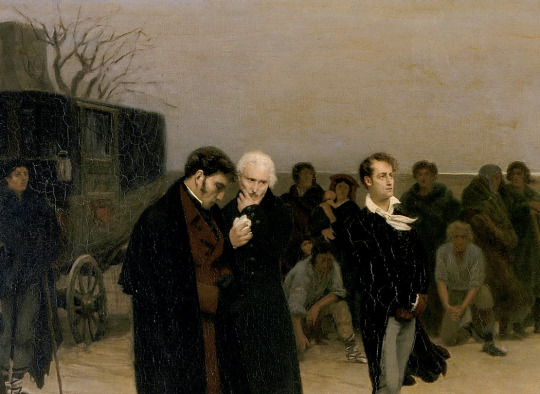
(Detail from The Funeral of Shelley, Louis Édouard Fournier, 1889)
Hey there to the depraved! If you aren't already familiar with the theory, here are some previous discussions/metas on the subject:
Full Blown Meta:
A Hidden and Forbidden Love by @princess-in-a-tower
Ask Answers (Long):
Jonsa as a more positive mirror to Jaime and Cersei? by @princess-in-a-tower, with additional comment by @jonsameta
Discussing the theory by @jonsameta
Evidence for pre-canon Jonsa? by @agentrouka-blog
Kissing in the godswood? by @agentrouka-blog
Why don't we read about Jon's reaction to Sansa and Tyrion? by @agentrouka-blog
More on Jon's supposed non-reaction by @agentrouka-blog, with additional comment made by @sherlokiness
A Jonsa "Unkiss"? by @fedonciadale
A hidden memory? by @fedonciadale
Sansa's misremembering by @fedonciadale
Descriptive parallels between A Song for Lya and Jonsa by @butterflies-dragons
Ask Answers (Short) & Briefer Mentions:
Jealous Jon by @princess-in-a-tower
Your new boyfriend looks like a girl by @butterflies-dragons
Like in Part 1, I've tried to cite as much as I could find, but as always, if anyone feels like I've missed someone important or that they should be included in the above list, please just drop me a line!
Now, it's a controversial theory, and not everyone's cup of tea — I think that's worth acknowledging! I myself am not wholly married to it, I'd be fine if it wasn't the case, but that being said, I can't in good faith ignore it when considering Lord Byron and the Byronic Hero. The incest is, unfortunately, very hard to ignore, both in his work and in his personal life. It's pretty hard to ignore in Manfred, for that matter, which is why I've held off talking about it... until now!
All aboard the Manfred incest train *choo choo* !!
First stop, Act II, scene one. Oh, wait, an annoucement from your conductor... apologies everyone, I purposely neglected to mention quite a key detail. Remember "Astarte! [Manfred's] beloved!", (II, iv, 136)? Yeah... it's heavily implied that Astarte is in fact Manfred's half-sister. *shoots finger guns* Classic Byron! *facepalms*
Oh, and that's not all! Let's consider the context surrounding the writing of this work for a moment, shall we? Unlike The Bride of Abydos (1813),* Manfred was written notably after the fallout of his incestuous affair with his half-sister, Augusta Leigh, composed whilst in a self-imposed exile. *spits out drink* Woah, woah there cowboy... what in tarnation?! EXILE?!
*As referenced in Part 1, @rose-of-red-lake has written an excellent meta on the influence of Lord Byron's work (and personal life) on Jonsa, paying special attention to the half-siblings turned cousins in The Bride of Abydos.
Although, as noted by rose-of-red-lake, The Bride of Abydos bears strong parallels to the potential romance of Jon and Sansa, as well as Byron’s own angst regarding his relationship with Augusta Leigh, the context surrounding Manfred seems... dare I say it, even more autobiographical. Because like Byron himself, Manfred wanders around the Bernese Alps, solitary and guilt ridden, in a state of exile heavily evocative of Byron's own — as I mentioned earlier, the beginnings of Manfred occured whilst Byron was staying at a villa on Lake Geneva, in Switzerland... the Bernese Alps are located in western Switzerland. In light of this, I think it's very understandable that some critics consider Manfred to be autobiographical, or even confessional. The unnamed but forbidden nature of Manfred's relationship to Astarte is believed to represent Byron's relationship with his half-sister Augusta. But what has that got to do with Jon?
Look, I don't know how else to put this:
Byron self-exiles in 1816, first to Switzerland, to Lake Geneva, where it is unseasonably cold and stormy — his departure from England is due to the collaspe of his marriage to Annabella Milbanke, unquestionably as a result of the rumours surrounding his incestuous affair with his half-sister.
Displaced nobleman Manfred wanders the Bernese Alps, in a kind of moral exile, where "the wind / Was faint and gusty, and the mountain snows / Began to glitter with the climbing moon" (III, iii, 46-48), traversing "on snows, where never human foot / Of common mortal trod" (II, iii, 4-5), surrounded by a "glassy ocean of the mountain ice" (II, iii, 7). He feels extreme, but unexplained guilt surrounding the death of his "beloved" Astarte, who is heavily implied to also be his half-sister.
In A Game of Thrones, Jon Snow chooses to join the Night's Watch, with the reminder that "once you have taken the black, there is no turning back" (AGOT, Jon VI). By taking the black, Jon arguably exiles himself from the rest of the Starks, from Winterfell, to a place that "looked like nothing more than a handful of toy blocks scattered on the snow, beneath the vast wall of ice" (AGOT, Jon III). But we aren't given any indication that he does this due to incestuous feelings regarding a "radiant" half-sister, akin to Byron/Manfred, are we? And it's not like we have several Manfreds/Manfryds AND Byrons namedropped within the text, is it? Oh wait... we do. *grabs GRRM in a chokehold*
What the hell, George?!
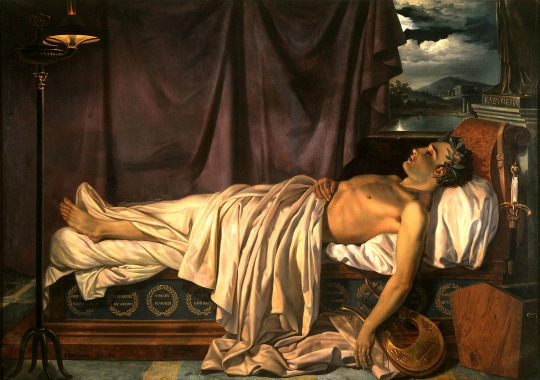
(Lord Byron on His Deathbed, Joseph Denis Odevaere, c. 1826)
But lets get back on track here and take a closer look at that section of Manfred I mentioned at the beginning — Act II, scene one, aka the part where all the incest and supressed trauma really JUMPS out.
So, early in Act II, in the chamois hunter's abode (a chamois is a type of goat?), according Assaad's analysis, Manfred is "hyper-aroused by a cup of wine." The wine is offered in an attempt to calm Manfred; however, to the chamois hunter's great dismay, it instead agitates him and makes him utter words which are "strange" (II, i, 35). Rather than wine, Manfred sees "blood on the brim" (II, i, 25). His sudden agitation and erratic behaviour confound the chamois hunter, who observes that Manfred is losing his mind: "thy senses wander from thee" (II, i, 27). Assaad's analysis of this scene, which she believes "is the most revelatory in the entire play" discloses "a bitter truth: Manfred's traumatic past informs his present life."
We might compare this with Jon, in particular, how his dreams reveal certain bitter truths to do with his past, now subconsciously informing his present. I've already looked a bit at his crypt dream from AGOT, Jon IV, but we see a sort of recurrence of this dream again in ASOS, Jon VIII. The imagery of being in a crypt, somewhere underground, buried, in the dark, a place of ghosts and spirits, is extremely evocative. Indeed, to go back to Byron's own description of Manfred, the setting of a crypt is extremely suggestive of certain bitter truths "left half unexplained", of secrets buried... and we know that's true because the secret of Jon's parentage is hidden down there, in the form of Lyanna Stark.
He dreamt he was back in Winterfell, limping past the stone kings on their thrones. Their grey granite eyes turned to follow him as he passed, and their grey granite fingers tightened on the hilts of the rusted swords upon their laps. You are no Stark, he could hear them mutter, in heavy granite voices. There is no place for you here. Go away. He walked deeper into the darkness. "Father?" he called. "Bran? Rickon?" No one answered. A chill wind was blowing on his neck. "Uncle?" he called. "Uncle Benjen? Father? Please, Father, help me." Up above he heard drums. They are feasting in the Great Hall, but I am not welcome there. I am no Stark, and this is not my place. His crutch slipped and he fell to his knees. The crypts were growing darker. A light has gone out somewhere. "Ygritte?" he whispered. "Forgive me. Please." But it was only a direwolf, grey and ghastly, spotted with blood, his golden eyes shining sadly through the dark... – ASOS, Jon VIII
I don't think it's outlandish to state that, unquestionably, Jon's bastard identity is a source of ongoing pain for him. I talked about the theme of despair in Jon's characterisation and it is very evident in the above, and it stems from this "bitter truth" of not being a trueborn Stark, of not being "welcome", or having a true place. The emotions/mindset this trauma, concerning his birth and identity, evokes in Jon is arguably what brings him, on first glance, so closely in line with the Byronic Hero:
Their grey granite eyes turned to follow him as he passed / The crypts were growing darker = A mysterious past / secret sin(s)
You are no Stark / I am no Stark = Deeply jaded
There is no place for you here / I am not welcome there / This is not my place = standing apart from society and societal expectations / social alienation
He dreamt he was back in Winterfell / He walked deeper into the darkness = Moody / misery in his heart
He fell to his knees / Forgive me = Guilt
He walked deeper into the darkness / Please, Father, help me / He fell to his knees = Despair
These aren't all the Byronic characteristics I've addressed in relation to Jon, but it is a substantial percentage of them, all encapsulated, in one way or another, within this singular dream passage. As far as what is fairly explicit in the text, being a bastard is Jon's "bitter truth", it is the "traumatic past inform[ing] his present life." But what is Manfred's "bitter truth", what past trauma is informing his present? And can it reveal a bit more about another layer to Jon's trauma? Because there is a key distinction — Manfred's trauma, his PTSD, stems from a specific event, notably triggered by the (imagined) "blood on the brim" of his wine, whereas for Jon, we have no singular event, we have no momentus experience, we just have this "truth."
As mentioned previously, Assaad has recognised the character of Manfred as displaying symptoms of post-traumatic stress disorder (PTSD). In Assaad's article, she remarks that "an experience is denoted as traumatic if it completely overwhelms the individual, rendering him or her helpless," and this is quite evident in the interaction between Manfred and the chamois hunter. Sharon Stanley, an educator and clinical psychotherapist, writes that "the word trauma has been used to describe a variety of aversive, overwhelming experiences with long-term, destructive effects on individuals and communities."
So, if trauma is related to an experience, or experiences, is it still accurate to say that Jon experiences trauma, connected to being a bastard? Because there is seemingly no singular or defining root experience, or event that it stems from, it just is… it is a compellation of several moments, revealed to the reader through Jon’s memories and/or dreams. What is being "left half unexplained” here?
Assaad makes reference to the American Psychiatric Association's definition of PTSD, in which it observes that for an individual to be diagnosed with PTSD, they have to suffer from one or more intrustion symptoms, one or more avoidance symptoms, two or more negative alterations, and two or more hyperarousal symptoms. The dreams Jon has certainly suggest something, but it seems like a stretch to say that, like Manfred, he is suffering from PTSD, right? We and Jon are very much aware that he is "no Stark", at least not in the sense that he is Ned's trueborn son, this isn’t something Jon is actively suppressing. By comparison, it is incontrovertible that Manfred committed something in the past, which he deeply wishes to forget and disassociate from:
Man. I say ’tis blood—my blood! the pure warm stream
Which ran in the veins of my fathers, and in ours
When we were in our youth, and had one heart,
And loved each other as we should not love,
And this was shed: but still it rises up,
Colouring the clouds, that shut me out from heaven,
Where thou art not—and I shall never be.
C. Hun. Man of strange words, and some half—maddening sin
(II, i, 28-35)
However, we cannot be sure what this traumatic point of origin is, though we know that it is related to something he has done to his beloved Astarte, which subsequently led to her death. Many critics have suggested that his sin is that of incest, and as I noted earlier, that Manfred as a whole is more than just a bit autobiographical and/or confessional in nature. Manfred's incestuous sin therefore re-enacts Byron's incest with his half-sister Augusta. But regardless of the true cause, Manfred is traumatised by his past and cannot overcome it. Is there something in Jon’s past, that may have subconsciously, or consciously, influenced his departure to the Wall — his self exile — which he cannot overcome, and which is closely tied to the issue of and pain he feels due to being a bastard, not just the illegitimacy, but also the negative characteristics it assigns? Is there an event, or experience, we can pinpoint as the origin of Jon’s trauma and potential PTSD?
To circle back to Jonsa, there is some, not unfounded, debate amongst us concerning the validity of the pre-canon crush/kiss theory. I've always found it an interesting theory, but until now, I haven't really given it too much thought. In light of the Byron connection, however, as well as the textual analysis I have for Part 3, I think this scenario, as detailed by agentrouka-blog, seems more and more likely. And I don't say that lightly, I really don't. It is a somewhat uncomfortable speculation to make, even if the interaction was more innocent rather than explicit (this is the side I firmly fall down on), however, it’s ambiguity does potentially parallel Byron’s Manfred and Astarte. This post would be even longer if I included my side-by-side text comparisons, so you may have to trust me for the moment that there are some very striking similarities between Act II, scene I of Manfred, and Jon's milk of the poppy induced dream in ASOS, Jon VI, as well as the actual buildup to that vision.
But, that sounds frankly terrible doesn't it? And it doesn't bode well for his future relationship with Sansa, does it? And what does it mean if Jon is suffering from PTSD due to an incestuous encounter with Sansa? What does that mean for Sansa, Sansa who is doggedly abused and mistreated by men within the present narrative? This is awful, why would GRRM root their romance in something traumatic? Oh I hear you, and these are questions I needed to ask myself whilst compiling this. But you see... now bear with me here... it isn't the actual encounter itself that was traumatic, for either Jon or Sansa, and that is reflected in both their POVs, because, though they think about each other sparingly (explicitly at least), it is never done so negatively. No, the potential PTSD Jon suffers from this experience isn't connected to Sansa, to whatever occured between them. Rather, I believe, it's connected to either the fear, or the reality, that Ned, his assumed father, saw and/or caught him (either Sansa had left at this point, or didn't fully grasp the issue), and this fear, this guilt, this sense of despair, is made evident in this passage:
When the dreams took him, he found himself back home once more, splashing in the hot pools beneath a huge white weirwood that had his father’s face. Ygritte was with him, laughing at him, shedding her skins till she was naked as her name day, trying to kiss him, but he couldn’t, not with his father watching. He was the blood of Winterfell, a man of the Night’s Watch. I will not father a bastard, he told her. I will not. I will not. “You know nothing, Jon Snow,” she whispered, her skin dissolving in the hot water, the flesh beneath sloughing off her bones until only skull and skeleton remained, and the pool bubbled thick and red. – ASOS, Jon VI
That's the traumatic experience, I believe, not the kiss — yep, I strongly suspect there was a kiss. Moreover, Jon's recurring assertion, throughout the series, that he "will not father a bastard" is tied to this in some way, it’s tied to Ned, it’s tied to some sense of guilt and shame. It’s not tied to Sansa. But we'll look at this passage, what it means, what it parallels, and what directly precedes it, in comparison to Manfred, a lot more closely next time.
I'll leave you with a slight teaser though — the parallel that made me really sit up and take notice:
C. Hun. Well, sir, pardon me the question,
And be of better cheer. Come, taste my wine;
'Tis of an ancient vintage; many a day
'T has thaw’d my veins among our glaciers, now
Let it do thus for thine. Come, pledge me fairly.
Man. Away, away! there’s blood upon the brim!
Will it then never—never sink in the earth?
(II, i, 21-26)
Note this imagery!!!
Maester Aemon poured it full. "Drink this."
Jon had bitten his lip in his struggles. He could taste blood mingled with the thick, chalky potion. It was all he could do not to retch it back up. – ASOS, Jon VI
In both instances, a drink is offered, with "blood upon the brim", and "blood mingled". In Manfred's case, this is an explicit trigger for him, whereas for Jon? Well, it bit more hidden, a bit more buried, but this moment is, to my mind, the catalyst, because its imagery strongly evokes the colours of the weirwood tree — "blood" red and "chalky" white — you know, the "huge white weirwood" he later on envisions.
*spits out drink*
Maybe the magnitude of this parallel isn't completely evident as of yet, but it will be... or at least I hope it will be, so stay tuned for Part 3!
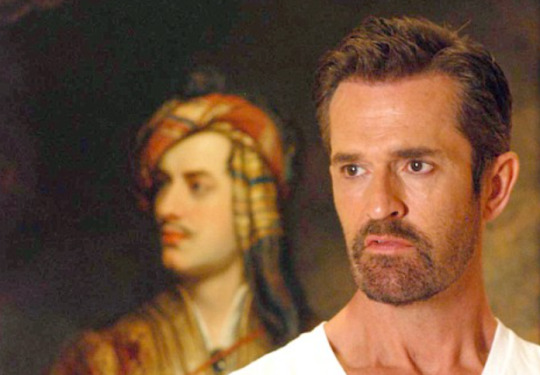
(Starting to run out of Byron pics so... I dunno, here's Rupert Everret, from The Scandalous Adventures of Lord Byron, 2009)
In Conclusion
To summarise, why is the Manfred connection so monumental to me? Why do I find the pre-canon kiss theory, specifically the scenario detailed by agentrouka-blog, now very hard to dismiss? Because:
The nine (!) Manfreds/Manfryds included within the text, as well as the two Byrons, one of which, the first mentioned in fact, first appears in Sansa's POV. But crucicially the direct link made by GRRM between Byron Swann and Manfred Swann.
The strength of the similarities that can be observed between Jon and the Byronic Hero, but also notably to Byron's Manfred, the "Byronic hero par excellence", according to Assaad. Especially the recurring emotions of guilt and despair, the latter exemplified perhaps most clearly in Jon's dreams.
The prominent theme of self-exile to escape something, something that perhaps cannot be openly stated, present in Manfred, Byron's own life, and Jon's narrative.
Those pesky half-sisters: Augusta, Astarte, and Sansa.
The PTSD symptoms clearly present in Manfred, but left "half unexplained", and seemingly not explained at all in Jon's POV — I'll dig more into this in Part 3.
The "blood upon the brim", and "blood mingled" — more on that in Part 3, I hope you guys like in depth imagery analysis!
Obviously, this is all still just speculation on my part, and it's speculation in connection to a theory that is understandably controversial. I'd be happy to dismiss it... if it weren't for the above. So, I suppose I'm in two minds about it. On the one hand, however you look at it, it's more trauma in an already traumatic series... which is *sighs* not what you want for the characters you care strongly about. But on the other hand, that literary connection to Manfred (and by extension to actual Lord Byron), the way it's lining up, plus that comparison GRRM himself made between Jon and the Byronic Hero... that's all very compelling and interesting to me as a reader, as a former English literature student. So, I don't want it to be true because... incest hell. But then, I also want it to be true because then it makes me feel smart for guessing correctly.
But anyway, we're going to be descending into incest hell in Part 3, so... we'll just have to grapple with that when we come to it. I hope, if you stuck with it till the incesty end, that you enjoyed this post!
Stay tuned ;)
Bibliography of Academic Sources:
American Psychiatric Association, Diagnostic and Statistical Manual of Mental Disorders, 5th edn (Arlington, VA: American Psychiatric Publishing, 2013); online edition at www.dsm5.org
Assaad, Lara, "'My slumbers—if I slumber—are not sleep': The Byronic Hero’s Post-Traumatic Stress Disorder", The Byron Journal 47, no. 2 (2019): 153–163.
Byron, George Gordon Noel, Byron’s Letters and Journals. Ed. Leslie A. Marchand. 12 vols. London: Murray, 1973–82.
Holland, Tom, "Undead Byron", in Byromania: Portraits of the Artist in Nineteenth- and Twentieth- Century Culture, ed. by Frances Wilson (Basingstoke: Palgrave, 2000).
MacDonald, D. L. "Narcissism and Demonality in Byron’s 'Manfred'", Mosaic: An Interdisciplinary Critical Journal 25, no. 2 (1992): 25–38.
Stanley, Sharon, Relational and Body-Centered Practices for Healing Trauma: Lifting the Burdens of the Past (London: Routledge, 2016)
Twitchell, James B., The Living Dead: A Study of the Vampire in Romantic Literature (Durham, NC: Duke University Press, 1981).
#jonsa#jon x sansa#jonsa meta#jon as the byronic hero#byronic hero#lord byron#tw: incest#cappy's thoughts#grrm and the Romantics#Jonsa and Romanticism#percy bysshe shelley#romantic poets#literary references#damn this was a long one!#glad a split it into another part!#i started to get a bit unhinged by the end not gonna lie
96 notes
·
View notes
Note
Okay so these are loose hc’s. I change them all the time, so this is just what’s on my list at the current moment. Pardon it sounding a bit messy. Originally my reasons for ron not being an auror was to work at WWW, but I like your baking HC so I changed it a bit.
Harry still becomes auror right after war. He would feel the need to finish tracking down all the remaining death eaters.
Ron realizes that maybe him and Hermione aren’t meant for each other. He’s always believed they were, so now he’s re-thinking everything. Did he actually like hermione? Or did all that golden trio history just make him feel like she was his only friend who was a girl, hence who he “picked?” Does he actually want to be an auror? Or is it just because Harry wants to be one? With fred dead and the war over, he wants to discover what he actually likes without the pressure or influence of his golden trio reputation. He’s tired of being a follower. He’s tired of doing what his family expects him to. He reevaluates and thinks “I love to bake.” So he opens a bakery.
Harry works as an auror for a few years. He gets stronger and more skilled and does very well. He’s good at it. In fact, he’s great at it. He’s a damn good auror. But he hates it. It’s just fighting and murder cases, kidnapping cases, rape cases, illegal potion cases… it’s all so dark and depressing. He wants that darkness in his life to be gone. He’s spent so much of his life living in darkness. He’s tired of never knowing if he’ll be alive the next day. He doesn’t have his friends fighting by his side anymore. All the aurors just gossip about him and talk behind his back. He likes some aspects of the job. He likes the action, the physical training, getting to sometimes save a life. But the bad outweighs the good. He’s stressed and pissed off all the time, and to be honest, he’s depressed. He sees all his friends and family loving their jobs and being excited to go to work, and content when they come home. He wants that.
One day the aurors have a medical/first aid seminar, and Harry loves it. He goes down to st mungos one day and just sits in the waiting room. He sees healers smiling and having coffee, and overhears a couple talking about how adorable their patients are. It’s… happy. Peaceful, even. The thought of getting up everyday and just helping people… it’s a lightness that seems impossible for him.
He nervously tells Ginny he doesn’t know if he wants to be an auror anymore, expecting her to be shocked and disappointed, and instead she just said “You finally figured it out. Took long enough. You look miserable all the time, and it’s not a good look for you, Harry. 2/10 recommend this life for you. The 2 is just because auror robes are kinda sexy.”
He looks at her in awe. Without planning it, because he hasn’t even properly thought it through, he looks at her and says “And what do you think about healer robes?”
She says “As long as there’s a smile on your face accompanying them, I think you’d look damn sexy in white.”
I have more detail, but those are the basics. I think if Ron didn’t do it with him, that would be a big contributor to him being miserable at work. And if Sirius was alive, I don’t think harry would be as driven to be an auror, for reasons that I think are very complicated and won’t go into.
-Red Solo Cup
Wonderful headcanons!
The idea is very intriguing to me although!
I feel like I’d want to give Ginny a different job too. Like make it completely AU.
Hermione would just go to Australia by herself and just never come back. 🤣🤣🤣
16 notes
·
View notes
Note
I loved your last Rarry brotp fic! Can you please write one about Ron getting himself hurt during an Auror mission because he wanted to safe Harry? And Harry getting mad at him for saving him and getting himself in danger instead? I hope you understand what I mean 🤪 Thank you!
Hi there! Thanks so much for the request. I absolutely loved writing that drabble, and was overwhelmed by the pleasant response to it! Hope you enjoy this follow-up 😊💜
We Live - Rarry brotp drabble #1
CW: Talk of violence, injury, mild language
A True Partnership
In some ways, Harry believed that he and Ron had trained to become Aurors since they were 11 years old. Together, they were held accountable for any decisions made under extreme duress year after year at Hogwarts and beyond — quite frankly, they both, along with Hermione, should have been killed several times over by now.
For many years, Harry had an instinctual fight-or-flight response to the dire circumstances that presented themselves. He knew that every move he made affected his future, and the future of those around him in the wizarding world that he tried desperately to protect.
Fast forward to the fall of 1998 when Harry and Ron underwent basic training together. During that time, they learned advanced tactics they would utilize in order to suppress any enemies, and were taught magical jurisprudence, ensuring that they apprehended criminals on legally valid grounds. For two men who consistently broke school rule after school rule at Hogwarts, this particular aspect of training was harped upon more than others.
The Auror Academy was very stringent, and not for the faint of heart — Aurors needed a certain level of mental alertness and physical strength to engage in conflict. They had to have a willingness to act in high-stake situations. Split-second decisions would be made, with no certifiable way in those moments to determine whether or not those decisions would be the right ones. Training is meant to prepare Aurors for crises that may arise, but real missions out in the field often present the unexpected — what many don’t see coming.
That’s what partners were for. A true partnership was built upon the following principles: trust, commitment, and shared meaning.
Trust: Ensure that your partner unequivocally has your back in any situation, from a Dementor attack to preventing further mutiny, and will be there to cover up your blind spots.
There was no one in the world that Harry trusted more than Ron Weasley, so his best mate was the obvious choice to be his partner out in the field. It took Harry a long time after the defeat of Voldemort for him to grasp that he no longer needed to be so guarded. In the event that Harry ever let down his defenses, he had full confidence that Ron would be there ready to assist.
So, it shouldn’t have surprised Harry that there would come a time when he wouldn’t be quick enough, or stealthy enough, and Ron would be there to respond.
It all happened so fast. One minute they were joking about pranking each other with puking pastilles, and the next moment they were surrounded by Death Eaters.
“Harry, watch out!”
A split-second decision.
That single decision made by Ron to warn Harry of the danger distracted the ginger-haired man from his own, and a flash of red light shot straight through his abdomen. Harry watched in horror as Ron’s injured body crumpled to the ground.
“No!” Harry shouted, and the fight to stay alive was a blur from there. All he knew was that he had to survive the battle — he had to survive and get his best friend, his partner, to safety.
Commitment: The act of sharing a mutual appreciation. Both partners should be on board to protect each other for the long haul.
Several agonizing hours later, Harry found himself pacing the floors of the Janus Thickey Ward at St. Mungo’s.
A Healer finally came out to give an update on Ron. Although pretty bruised up, and drowsy from the pain potion, he was okay and conscious.
Beside him, Harry heard Hermione let out a strangled cry of relief.
They allowed two visitors in at a time, so Harry and Hermione rushed down the busy corridor and practically threw themselves through the door to get to Ron.
He was sitting up in his bed, a large, white bandage wrapped around his stomach, and his leg was propped up by a levitating sling. Ron's face, although initially contorted in pain, visibly brightened once he saw both of them.
Hermione wasted no time running into Ron's arms, who responded by giving her a weak pat on the back that was no doubt meant to be comforting. "Hi, love."
Hermione sniffled as she kissed his cheek and pulled away, stepping back to allow Harry a moment to greet his best friend.
When Ron's eyes shifted towards Harry expectantly, he laughed, "I dodged a bludger there, didn't I?" His face fell as he spotted the furious expression on Harry's face.
"You," Harry glared at Ron, pointing a menacing finger in his direction. "I need to have a chat with you."
Ron opened his mouth to speak, but Harry didn't give him the chance.
"What in the name of Merlin's saggy left armpit were you thinking out there?"
"You could have gotten yourself killed!" Hermione piggy-backed off Harry's interrogation, a flurry of words streaming out through her mouth. "I mean, really Ron, out of all of the noble things you had to do, you think that—"
"Oi, knock it off, Hermione!" With a frustrated growl, Ron snatched his wand from the side table and whooshed closed the drapes around his bed, hiding Hermione from view. He then muttered a silencing charm for added effect.
Harry raised his eyebrows. “Do you even realize what you’ve just done?” He didn’t want to be there to witness the aftermath of Ron’s decision to shut out Hermione.
"I've already got you yelling at me, I don't need my girlfriend screaming in my ear, too, thank you very much,” Ron grumbled, letting his head fall back onto his pillow with a heavy sigh.
Harry crossed his arms. "Well you wouldn't need us to chatter on as such if you hadn't very nearly kicked the bucket."
"Well, o'course not," Ron snapped. "I just saved your life, and all, but I'm the one who was in the wrong."
"I wouldn't have needed saving if you'd had just followed protocol and attacked those gits right away instead of worrying about me."
"One of those fuckers had a wand aimed at the back of your head, what was I supposed to do?" Ron fought back.
It was then that Harry realized Ron saw what he couldn't. His blind spot. A wave of guilt washed over him, and Harry knew he had no right to argue further.
Ron looked down at his lap, his voice quiet. "When are you going to get it through your head that you can't always do it all by yourself, mate?"
The impact of Ron's words made Harry take a step back. The harsh silence that followed indicated to Ron that he was free to continue,
“We are a team. Partners. I know you’re so bloody proud, Potter, but you can’t expect to make the right decision every time. I am here to back you up. Always.”
Tears welled up in Harry's eyes, overwhelmed by the love he felt for his best friend, his partner in crime, his brother.
Shared meaning: An understanding or appreciation for your partner, and what values they stand for.
Harry and Ron had managed their fair share of conflict over the years, finding the ability to compromise, solve problems, and take on the world together. They turned towards each other on a daily basis, whether it's to share a laugh over the strangest topics or provide emotional support.
Their relationship went beyond a simple partnership. They were family. A unit.
Harry choked out a laugh, "Okay, then. But it's my turn to be the hero next time, you hear?"
A wide grin split across Ron's face. "Not if I beat you to it."
The drapes whooshed open again, revealing a very put out Hermione. "You two aren't honestly fighting over who gets to risk their life next, are you?"
Harry and Ron share sheepish smiles, and a mutual understanding passes through them.
Friendship is forever, and they will never stop finding ways to prove that.
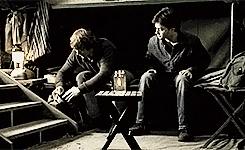
#rarry drabble#rarry brotp#rarry fanfic#ron and harry brotp#ron x harry#ron weasley#harry potter#hp fanfiction#hp fanfic#brotp#friendship#auror harry#auror ron#post battle of hogwarts#cheesyficwriter
102 notes
·
View notes
Text
How I Became an Archaeologist
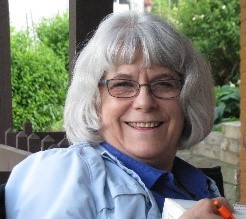
If you had told me when I was 15 that I would spend my life as an archaeologist, I probably would have been pretty surprised. I didn’t grow up knowing a great deal about archaeology or even being fascinated by arrowheads. At that time, I might well have asked what an archaeologist really is and what one actually does. I did get to visit the Parthenon and other ruins while on a trip with my aunt when I was sixteen. Even then, I don’t remember having more than a casual interest in what could be learned from these places. I was more interested in the living people and the new food dishes I encountered on that trip, which was my first trip outside the United States.
From talking to other archaeologists, I’ve learned that there are a lot of paths to deciding archaeology is going to be your life’s work. In my case, what led me to archaeology was anthropology, and specifically an elective course I took in the Fall of my senior year in high school that was taught by a Ph.D. student at the University of Massachusetts. Until then I had not been a serious student, although I did well enough in school. Perhaps I was slightly bored by most of my courses, but anthropology was anything but boring! It looked at people elsewhere in the world and over great periods of time. Many of these people lived different lives than my friends and I did, and they sometimes thought very differently about what was important in life than people here in the United States. I was fascinated, and, honestly, I particularly liked the fact that the conventions of American society, which to my teenage self were sometimes a little confining, weren’t after all the only sensible way to approach life. That year, as I chose a college to attend, I specifically looked for anthropology programs. I chose Beloit College in Wisconsin, which to this day has an excellent anthropology program.
Initially, I thought that I was most interested in cultural anthropology, but like most anthropology departments in the United States, Beloit required its anthropology majors to take courses in biological anthropology, linguistic anthropology, and archaeology as well as cultural anthropology. These are what are known as the four fields of American anthropology and together, they give us a more complete picture of humans in both the past and the present. Most people focus their careers in one subfield or another, though we recognize the importance of each one for understanding humans, and in most cases in North America our degrees are in anthropology not one of the subfields. In college, I found all these courses more fascinating than anything I had studied before, and I actually became a good student as I explored anthropology. I was learning so much neat stuff! I also did volunteer work in the Logan Museum at Beloit, which was founded at the end of the nineteenth century and holds some pretty amazing ethnographic and archaeological collections. It was there I first became interested in artifacts and learned to clean and care for them. After a college internship in cultural anthropology convinced me that cultural anthropology was not the most interesting part of anthropology after all, I began to focus on archaeology. I was most intrigued by my courses in Mesoamerican archaeology and North American archaeology, which before college had been completely unknown to me.
When I graduated from college, I still wasn’t sure what I would do with my life. I worked for about two years both in social work and as a tax auditor for the IRS, but decided in 1974 to try graduate school in archaeology because I still found what archaeology had taught me about past people compelling. I lived in Chicago, so I enrolled in the Ph.D. program in North American archaeology at Northwestern University in Evanston, Illinois.
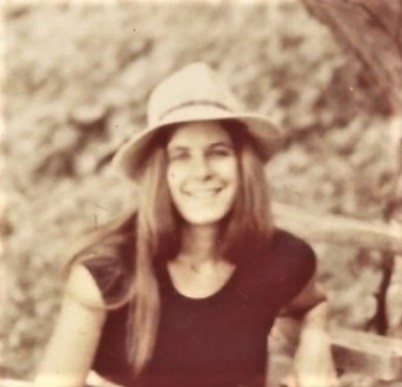
My graduate self in the late 1970s. Photo credit: Phillip Neusius
The biggest shock of graduate school was my professors’ almost immediate insistence that I pick what research I wanted to do. They pushed me to develop an expertise or skill within North American archaeology through my research. It sounds obvious to me now, but I think many beginning graduate students are like I was, lovers of the discipline’s knowledge, but a bit daunted by becoming an independent researcher. Developing an area of focus and specialty skills is part of becoming a professional archaeologist. One reason for this is because contemporary archaeological undertakings rely on teams of researchers, each contributing special skills and knowledge to accomplish the many aspects of excavation, analysis, and interpretation. If you envision archaeology as the solitary pursuit of an elusive artifact or site, you don’t have the picture quite right. Think instead of archaeological fieldwork involving groups of scientists working together to discover and carefully record many different bits of evidence about what the world used to be like and what people did in it. Also think about the many hours these scientists and others will spend not only in the field, but in the laboratory after an excavation is completed cleaning finds, describing artifacts, and analyzing data in order to make meaningful interpretations.
For someone like myself, who loved all aspects of anthropology, not to mention archaeology, and who had only gradually settled on North America as my geographic focus, picking a focus on entering graduate school was a hard task. There was so much that would be interesting to study! However, I did remember especially enjoying a research paper I had done in college on the relatively new interdisciplinary field of zooarchaeology, so under pressure, I told my professors I wanted to pursue this subfield in graduate school. Amazingly, this turned out to be a good choice of specialization for me. I found that I really love to work with collections of animal bone. For me, opening a bag of bone refuse from a site still is exciting. Bone identification work is a little like doing a jigsaw puzzle without all the pieces. It is challenging, and it takes concentration and careful observation to piece together what you can. There is so much to figure out about any single piece of bone! What animal is it? How healthy was the animal? What part of the animal’s body is it? Has it been burned or cut? How was the bone buried and changed after the humans were done with it? Then you have to record this information so it can be combined with other observations on the assemblage of bone you are looking at. After identification, making sense of what a collection of the bones means and correlating these kinds of data with other information from a site and region requires careful analysis, but also insight and creativity. To me it is endlessly fascinating.
Besides finding that I liked the work, choosing zooarchaeology was also serendipitous since my professors were looking for a student to work with them on this aspect of a big project they were undertaking in west-central Illinois centered on the Koster site, which was first inhabited more than 9000 years ago and then reinhabited by people right up into modern times. Most importantly the poorly known Archaic Period levels were numerous, well-preserved, and distinct from each other so we could add a lot of new information through our work. For my dissertation I was able to look at the animal remains from levels of this site dated between approximately 8500 and 6000 years ago, which represent how people used animals at that time.

Koster site strata. All those dark layers are from Archaic period camps at the site. Photo credit: Del Bastian, Center for American Archaeology.
Graduate school was intense, but I continued to be fascinated by archaeology’s ability to tell the story of people lost to standard Western history. In those days I was excited to be part of this science that could do so much more than describe and take care of cool artifacts. It was a heady thing to learn that I could contribute to what was known about people who lived thousands of years ago. In later years, I’ve had to think more critically than I did then about what a privilege it is for an archaeologist to learn about the history and lives of other ethnicities. Today’s archaeologists recognize their responsibility to present information about past people for both scholarly and public use in ways that are sensitive to what is considered sacred and private by the descendants of those people. I think this is an important change in perspective, but in the 1970s most archaeologists just wanted to show that people’s stories from the past could be told using the techniques of archaeology. I certainly was happy, if a little naively so, to have found a way to contribute to telling the human story.
If I consider entering graduate school as the start of my professional career as an archaeologist, I have been pursuing this career for more than 45 years! Over the years I have done zooarchaeological and archaeological work in the American Midwest, Southwest, Southeast, and Northeast working on telling the story of people who lived as long as 9000 years ago and as recently as the Sixteenth century. I’ve worked at several universities, in a small museum, and on small and large archaeological projects in the field of Cultural Resource Management (CRM) doing archaeological survey, site excavation, and zooarchaeological identification and analysis. I’ve written scholarly papers and articles as well as a textbook on North American archaeology. However, beginning in the late 1980s, I spent more than 31 years doing research and teaching anthropology and archaeology here in Pennsylvania at Indiana University of Pennsylvania. In this job I taught both undergraduates and graduate students, but, as is typical of university professors, I also spent time doing fieldwork and analysis as part of my research while at IUP. Fortunately, because archaeology is a team undertaking, I’ve been able to involve many students in my research. Working with students in research as they discover what fascinates them has been a highlight of being an archaeologist for me. I’ve now retired from teaching but not archaeology. I’m still working with both physical and digital archaeological collections both through CMNH and elsewhere and writing about archaeology. Who knows what this career still will bring me!
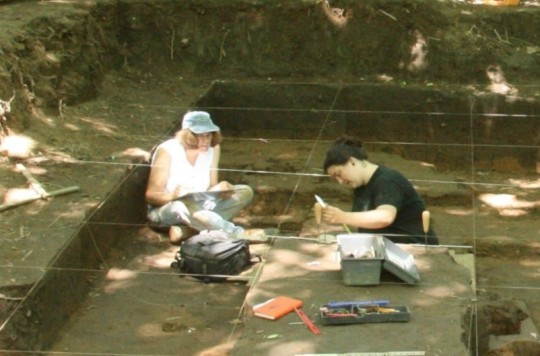
Drawing a profile at the Johnston site with one of my students in 2008. Photo credit: Erica Ausel, IUP Archaeology.
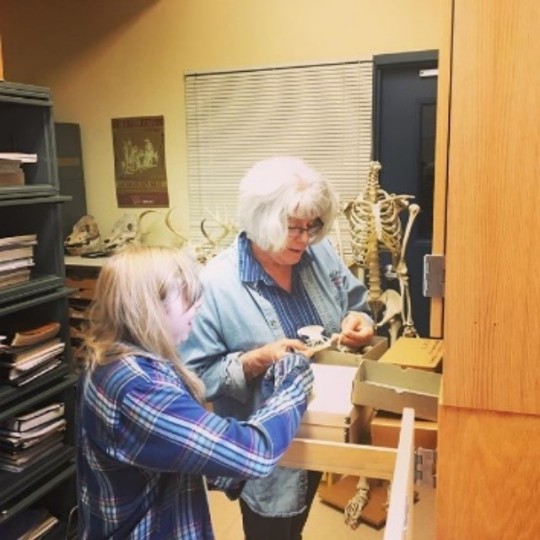
Tracking down a bone identification with one of my students in the Zooarchaeology Lab at IUP. Photo credit: Beverly Chiarulli.
If you are reading this blog because you are thinking about archaeology as either a career or a hobby, I hope you realize that mine is just one story among the many that could be told. Because there are so many aspects of archaeology, people come into it from all sorts of backgrounds and because of all sorts of interests. I think that it is important to remember though that it really is about understanding people and telling their stories through the artifacts and other evidence we find. This is what interested me in archaeology in the first place. Discovering the details of the human story is a giant undertaking. There is no shortage of research problems or work to do, but solving the puzzles presented by sites and collections is both challenging and fun. I’m certainly glad I decided to become an archaeologist and zooarchaeologist so many years ago!
Sarah W. Neusius is a Research Associate in the Section of Anthropology at Carnegie Museum of Natural History and Professor Emeritus, Department of Anthropology, Indiana University of Pennsylvania. Museum employees are encouraged to blog about their unique experiences and knowledge gained from working at the museum.
Definitions of Bolded Terms
anthropology -the study of humans including the physical, cultural and social aspects in the past and present.
cultural anthropology - the study of the cultural aspects of humans especially recent and contemporary social, technological, and ideological behavior observed among living people.
biological anthropology – the study of the biological or physical aspects of humans, including human biological evolution and past and present biological diversity.
linguistic anthropology - the study of the structure , history, and diversity of human languages as well as of the relationship between language and other aspects of culture.
archaeology - the study of past human behavior and culture through the analysis of material remains.
ethnographic – relating to the scientific description of people and cultures especially customs and beliefs.
Mesoamerican archaeology - the archaeology of the area from central Mexico southward through Belize, Guatemala, El Salvador, Honduras, Nicaragua, and northern Costa Rica.
North American archaeology - the archaeology of the area from central Mexico northward throughout the United States and Canada.
zooarchaeology – a subarea of archaeology involves the identification of animal remains from archaeological sites and investigates the ecology and cultural uses of the animals represented.
assemblage - a collection of artifacts from the same archaeological context.
Archaic Period - a time period from approximately 10,000 BP to 3000 BP that is recognized in most of North America.
Cultural Resource Management (CRM) – an applied form of archaeology undertaken in response to laws that require archaeological investigations.
archaeological survey – the systematic process archaeologists use to locate, identify, and record archaeological site distribution on the landscape.
163 notes
·
View notes
Note
Hello,
I’m currently three weeks into my RCIA classes, and one thing I have focused on in my discussions with my priest are the saints and Mary. We’ve touched on something I’ve run into: the concept of devotion to things like the Sacred Heart or certain saints/the Blessed Mother. This is something that I would like to add to my prayer life, although I’m not quite sure how to really begin praying outside of the rosary.
Do you have any suggestions or tips for those of us in the process of converting, that have enough to believe the Church is correct and want to dive into deeper aspects of the faith, but aren’t quite sure how to?
Thank you and God bless ❤️
There are a lot of different ways to dive deeper so I am just going to focus on my "favorites" as it were. I love reading articles and books to learn more about theological things, or about the scriptural aspects of our faith, like the Lamb's Supper by Scott Hahn that changes the way I see the Mass. Really the way I have "collected" as it were different devotions is by seeing them online or going to daily Mass and hearing priests talk about them. Then after I hear about them I google them and read about them there. Something like the Sacred Heart is a major devotion that Catholics have had for centuries so googling that or googling prayers to the Sacred Heart is a good way to do that. It really depends on the devotion of what that is going to look like in your daily life, but generally a "devotion" is just a prayer or something you do every day.
I know a good kind of "book" that you can get that has plenty of different devotions in that you can use here and there as you'd like is the "Queen of the Apostles" prayerbook by Pauline Media (the Daughters of St. Paul), it has a lot of different kinds of prayers as well as many, many saint devotions/novena prayers.
There are a lot of different kinds of devotions to the Blessed Mother, for example one that I really like outside of the Rosary is the Seven Sorrows of Mary, which is similar to the Rosary but focuses on some of those events from the perspective of Mary, rather than the perspective of Faith. Something like the Memorare is also said by most religious orders every day, and it's common to say it after Mass along with the St. Michael Prayer.
I know some people have a devotion to the Sacred Heart by doing the Litany of the Sacred Heart or the Litany of the Name of Jesus. Some will also do the Divine Mercy Chaplet, though personally for me, I relate it more to a devotion to the Passion and Death of Our Lord, which I also wear the Red Scapular for.
I also started praying the Litany of St. Joseph because I picked up a random prayer card at the Church I go to for Adoration, and that was on it. So it really is about slowly "collecting" things over the years for me. But the big ones like the Rosary (and a lot of traditions also include the Litany of the Blessed Virgin Mary or Litany of Loreto as it sometimes called, is prayed after the rosary) and the Sacred Heart are all-time favorites and you'll find a lot of different expressions of them.
My favorite litanies are these:
Litany of the Precious Blood
Litany of Loreto
Litany of St. Joseph
Litany of the Holy Spirit
Litany of Saints
So you definitely have a treasury of options for things to pursue! I suggest sticking to just one or two at a time and if you see fruits then continue it and add or take away some as you see fit. You can also always do "novena" versions of a devotion, where you do it every day for nine days just for a specific request.
God Bless! Semper per Miriam
#catholic#catholicism#christian#christianity#devotions#devotion#blessed mother#blessed virgin mary#sacred heart#sacred heart of jesus#tradcat#tradcatholic#tradcatholicism#traditional catholic#traditional catholicism#traditionalcatholic#traditionalcatholicsm#nuns#nun#take back the tag
24 notes
·
View notes